2013届高三年级第二次模拟英语试卷
- 格式:doc
- 大小:127.50 KB
- 文档页数:10

哎嘿特英格丽使北京市西城区2013届高三第二次模拟考试英语试题本试卷共150分。
考试时长120分钟。
考试结束后,将本试卷和答题卡一并交回。
注意事项:1.考生务必将答案答在答题卡上,在试卷上作答无效。
2.答题前考生务必将答题卡上的姓名、准考证号用黑色字迹的签字笔填写。
3.答题卡上选择题必须用2B铅笔作答,将选中项涂满涂黑,黑度以盖住框内字母为准,修改时用橡皮擦除干净。
非选择题必须用黑色字迹的签字笔按照题号顺序在各题目的答题区域内作答,未在对应的答题区域内作答或超出答题区域作答的均不得分。
第一部分:听力理解(共三节,30分)第一节(共5小题;每小题1.5分,满分7.5分)听下面5段对话或独白。
每段对话或独白后有一道小题,从每题所给的A、B、C三个选项中选出最佳选项。
听完每段对话或独白后,你将有10秒钟的时间来回答有关小题和阅读下一小题。
每段对话或独白你将听一遍。
例: What is the man going to read?A.A newspaper.B.A magazine.C.A book.答案是A。
1.What food does the man probably have?[来源学科网ZXXK]A.Beef.B.Fish.C.Noodles.2.What time does the woman usually get up on weekends?A.At 9: 00.B.At 10: 00.C.At 12: 00.3.What does the woman like doing?A.Collecting stamps.B.Reading books.C.Taking pictures.4.Why does the man say sorry?[来源学科网]A.The house is a mess. B.He hasn't been at home.C.He broke the plates and cups.5.What will the woman do this evening?A.Go to the library.B.Discuss with her professor.C.Have dinner with her friend.第二节(共10小题:每小题1.5分,共15分)听下面4段对话。
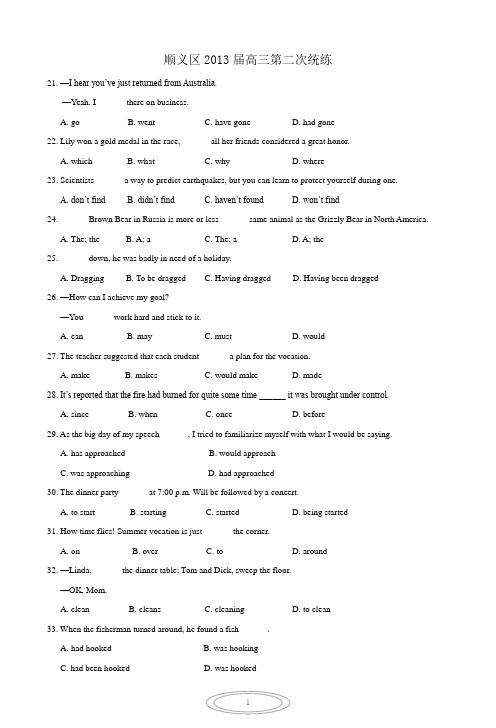
顺义区2013届高三第二次统练21. —I hear you‟ve just returned from Australia.—Yeah. I ______ there on business.A. goB. wentC. have goneD. had gone22. Lily won a gold medal in the race, ______ all her friends considered a great honor.A. whichB. whatC. whyD. where23. Scientists ______ a way to predict earthquakes, but you can learn to protect yourself during one.A. don‟t findB. didn‟t findC. haven‟t foundD. won‟t find24. ______ Brown Bear in Russia is more or less ______ same animal as the Grizzly Bear in North America.A. The; theB. A; aC. The; aD. A; the25. ______ down, he was badly in need of a holiday.A. DraggingB. To be draggedC. Having draggedD. Having been dragged26. —How can I achieve my goal?—You ______ work hard and stick to it.A. canB. mayC. mustD. would27. The teacher suggested that each student ______ a plan for the vocation.A. makeB. makesC. would makeD. made28. It‟s reported that the fire had burned for quite some time ______ it was brought under control.A. sinceB. whenC. onceD. before29. As the big day of my speech ______, I tried to familiarize myself with what I would be saying.A. has approachedB. would approachC. was approachingD. had approached30. The dinner party ______ at 7:00 p.m. Will be followed by a concert.A. to startB. startingC. startedD. being started31. How time flies! Summer vocation is just ______ the corner.A. onB. overC. toD. around32. —Linda, ______ the dinner table; Tom and Dick, sweep the floor.—OK, Mom.A. cleanB. cleansC. cleaningD. to clean33. When the fisherman turned around, he found a fish ______.A. had hookedB. was hookingC. had been hookedD. was hooked34. It‟s good for a university student to take up a job if he can get ______.A. itB. oneC. someD. that35. With the word “PM2.5” constantly ______ in media reports, you might be wondering what on earth it means.A. appearedB. appearingC. to appearD. being appearedI was born with cerebral palsy(脑瘫) and did not walk until after I was two years of age. Although my condition was relatively mild and I 36 quite well, I faced many challenges.I was regularly chosen last for a baseball team when school children were organizing a __37 . I never learned how to ice skate. It took me forever to learn to 38 a bike, and my knees and elbows were always injured in the process. Even so, I was a 39 boy and was well liked by my peers throughout elementary school.The most 40 time came when I began high school. I 41 up for the cross-country track and field team. My 42 had always been poor, and a slight push would send me flying to the dirt. Over the first few days other runners noticed my poor pace and would knock me __43__ balance as they lapped me on the track. To the 44 of some, I was forced to get up several times. They 45 me about my poor performance and made me the target of their one-sided fight. But I was never a 46 . I stayed with track and field even though the harassment(骚扰) at the track 47 .One day in early October, we had unexpected snow and freezing rain. The track team was allowed to 48 indoors. I borrowed the stopwatch from the coach and 49 my time on the track. As the other kids exercised in the gym, the y couldn‟t help but notice the one __50__runner dragging through freezing rain on the snow-covered track.The next week, the weather returned to normal, and outdoor training continued. The harassment, 51 , did not. Each time a member of the track team passed me, he would offer a few words of 52 .“Keep going, pal.”“Don‟t give up, bro.”“You can do it, buddy.”At the end of that month, I was voted “athlete of the month” and was presented with a certificate. I earned their 53 .Now whenever I des pair, I‟ll 54 myself that challenges are not overcome by force, but rather by determination and a sincere 55 in the natural goodness of others.36. A. managed B. worked C. behaved D. remained37. A. party B. trip C. game D. meeting38. A. push B. ride C. fix D. make39. A. clever B. kind C. lucky D. happy40. A. difficult B. important C. enjoyable D. critical41. A. raised B. carried C. picked D. signed42. A. eyesight B. judgment C. balance D. behavior43. A. off B. with C. in D. on44. A. excitement B. amusement C. contentment D. astonishment45. A. told B. teased C. warned D. questioned46. A. quitter B. runner C. fighter D. beggar47. A. appeared B. stopped C. increased D. continued48. A. rest B. study C. train D. play49. A. organized B. improved C. wasted D. enjoyed50. A. weak B. hard C. brave D. lone51. A. moreover B. therefore C. however D. though52. A. praise B. encouragement C. comfort D. congratulation53. A. attention B. trust C. thanks D. respect54. A. promise B. bless C. remind D. inform55. A. faith B. love C. interest D. prideASan Diego SummerThe summer after my second year in high school, I finally had the opportunity to live with my super-cool sister in San Diego for three weeks. It was going to be great! I would lie on the beach in the sun. Perhaps I would surf a little or ride my bike around Coronado Island.Meanwhile, I would spend every morning, Monday through Friday, teaching YMCA (Young Men‟s Christian Association) kids how to play tennis…for FREE. Since college wasn‟t too far off, and since I had practically zero hours of community service, my volunteering at the YMCA was smart. I like tennis and I even kind of like little kids. Anyway, life was going to be amazing for those three weeks.On my first day at the YMCA, I was shocked by the smallness of the children. The kids could barely grasp a racket(球拍), let alone swing one. This is when it occurred to me how potentially terrible the situation was—a group of thirty small children with rackets in hand and only four coaches. The odds were definitely against us. Luckily, the kids did not have blood on their minds, and they were relatively obedient and cooperative.It soon became painfully obvious that I was the only “coach” actually coaching. Rather ironic when one considered that I was the only one of the four NOT being paid. I must admit, however, that despite all of my efforts these children were not getting much. I had to keep telling myself that while I couldn‟t enjoy the fruits of my labor at the moment, I would be reveling in the benefits once college application time came. Thus, I soldiered on.As I returned home the day before the opening of school, I had complete peace of mind. Although I did not spend every day at the beach as I had initially hoped to do, I did accomplish several things and I felt as if I were a better person because of my three weeks in San Diego.56. Before going to San Diego the author was full of ______.A. expectationB. confidenceC. doubtD. curiosity57. The author taught YMCA kids to play tennis because she ______.A. loved small children and was active as a volunteerB. must do community service to be admitted to collegeC. wanted to earn some money to pay for her college feesD. would like to do something for others as a sincere Christian58. The underlined words “I soldiered on” reflec t the author‟s ______.A. desire to join the armyB. love for teaching tennisC. control for young learnerD. determination not to give up59. According to the last paragraph, we can predict that the author will ______ in the future.A. become a teacherB. move to the beachC. play tennis professionallyD. help others more willinglyBLICENSE AGREEMENTBy installing(安装) the software, you acknowledge that you have read all of the terms and conditions of this agreement and agree to be bound by them. Click “YES” and continue to install the game. If you do not agree to the terms of this agreement, click “NO” and directly return to the entire package to the place of purchase for a full refund(退款).LIMITED LICENSE: You may use this software for your own use, but may not sell or reproduce thesoftware in any way. You may use one copy of the software on a single computer. You may not network the software or use it on more than one computer at the same time.OWNERSHIP; COPYRIGHT: Title to the software, patents, copyrights, and all other property rights shall at all times remain entirely with Great Games. Software is protected by law and by international treaty. You may not cause or permit the software to be disclosed, copied, modified, adapted, or otherwise reduced to human readable form.LIMITED WARRANTY(保修): Great Games warrants for a period of ninety days from the purchase of this copy of the game that the software is free from errors or defects(缺陷) that will seriously interfere(冲突) with the operation of the software as described in the Documentation.If you believe you have found any such error or defect in the software during the warranty period and are in the United States, call Great Games‟ helpline at 800-383-2647 between the hours of 8:00 a.m. and 12:00 p.m. midnight, Monday through Friday, holidays excluded, and provide your Product Number; or if you are outside the United States, send your original software disc to Great Games at 3281 N. Risk St.Ocala, FL, 32410. Include your return address and Great Games will replace the disc within a reasonable period of time.60. What must the users make clear before installing the software?A. The place to get a full refund.B. The contents of the agreement.C. When to click “YES” or “NO”.D. Why to be bound by the agreement.61. What can you do with the software as a user?A. You are free to use the software in the first 90 days.B. You can adapt the software and get pay from “Great Games”.C. You can install one copy of the software on only one computer.D. You can get your money back if you are not satisfied with the game.62. What is the primary purpose of the Limited License?A. To protect Great Games‟ software.B. To explain Great Games‟ warranty.C. To warn the users of possible defects.D. To provide technical help to the users.CThe Lionfish Invasion!Lionfish are popular saltwater aquarium(水族箱) fish all over the world, especially in the United States.Nowadays, they also live in Atlantic waters off the East Coast of the United States. These lionfish are what scientists call an invasive(侵入的) species(物种) or an “alien invader.”Local divers off the coast of North Carolina were not expecting to see what they found one day in August 2002—the beautiful lionfish, common to the warm waters of the western Pacific, but unknown of the Carolina coast. They provided the first solid evidence that lionfish were in the Atlantic.A year later, scientists documented 19 lionfish sightings at eight locations along the North Carolina continental shelf. Then, lionfish were observed off the coasts of Florida, Georgia, and South Carolina, and even as far north as Long Island, New York! Between 2000 and 2003, lionfish sightings were reported at 16 different shipwrecks and natural hard bottom locations. During a summer 2004 research expedition, NOAA(The National Oceanic and Atmospheric Administration) scientists collected 155 lionfish at 19 different locations off the North Carolina coast alone. The jump in numbers and distributions over such a short time strongly indicates that the lionfish is reproducing in the Atlantic Ocean. If this is true, it‟s the first time tha t a western Pacific fish has populated the U.S. Atlantic coast.These lionfish were likely released on purpose when people no longer wanted them! The swift and warm Gulf Stream, which transported the floating lionfish eggs from Florida northward, helped th e lionfish‟s Atlantic journey. In Florida waters and along the continental shelf near the Gulf Stream the temperatures are very similar to the lionfish‟s native waters.However, from north Florida upward, the waters along the coastline are too cold in the winter for lionfish to survive. Scientists expect them to survive the winter only at water depths greater than 120ft because this is where the Gulf Stream has influence all year long. Very importantly, the types of predators(食肉动物) and competitors present in the Atlantic are very different from the native range of the lionfish. Generally, the lionfish have not been found to endanger marine ecosystems because they were not likely to survive long.63. Scientists call the lionfish an “alien invader” because t he lionfish ______.A. have damaged the native speciesB. are able to live in a new environmentC. came from one place and spread to anotherD. will attack other species with their poisonous teeth64. How does the author support the reproducing of lionfish in the Atlantic in Para.3?A. By analyzing causes.B. By providing figures.C. By raising questions.D. By expressing opinions.65. Which of the following is the main idea of the passage?A. Lionfish got into the Atlantic Ocean in 2002.B. Lionfish will not live long in the new environment.C. Lionfish is a popular aquarium fish in the United States.D. Lionfish has been populating the waters of the Atlantic Ocean.66. What is the author‟s attitude towards the lionfish invasion?A. Serious.B. Disapproving.C. Optimistic.D. Indifferent.DWhy Laughter MattersAlthough most people believe that laughter is one of the nature‟s great treatments for a whole range of mental and physical diseases, it is still a serious scientific subject that researchers are trying to figure out.“Laughter above all else is a social thing,” says Baltimore neuroscientist, Robert Provine, who has studied laughter for decades. “All laughter groups laugh …ha-ha-ha‟ basically the same way. Whether you speak Mandarin, French or English, everyone will understand laughter. There is a pattern generator(发生器) in our brain that produces this sound.”Laughing is our first way of communicating. Babies laugh long before they speak. No one teaches them how to laugh. They just do. People may laugh at a prank(恶作剧) on April Fools‟ day. But surprisingly, only 10 to 15 percent of laughter is the result of someone making a joke. Laughter is mostly about social responses rather to a joke. Deaf people laugh without hearing and people on cell phones laugh without seeing, showing that laughter isn‟t dependent on single sense but on social interactions.And laughter is not just a people thing. Chimps tickle(挠痒) each other and even laugh when another chimp pretends to tickle them.Jaak Panksepp, a Bowling Green University Psychology professor, studies rats that laugh when he tickles them. It turns out rats love to be tickled—they return again and again to the hands of researchers tickling them.By studying rats, sc ientists can figure out what‟s going on in the brain during laughter. Northwestern University biomedical engineering professor, Jeffrey Burgdorf has found that laughter in rats produces a chemical that acts as an antidepressant(抗抑郁药). He thinks the same thing probably happens in humans, too. This would give doctors a new chemical target to develop drugs that can fight depression.Even so, laughter itself has not been proved to be the best medicine, experts said. Margaret Stuber, a professor at University of California, studied whether laugher helped patients. She found that distraction(分心) and mood improvement helped, but she could not find a benefit of laughter alone.“No study has shown that laughter produces a direct health benefit,” Provine said, largely because it‟s hard toseparate laughter from just feeling good. But he thinks it doesn‟t really matter: “Isn‟t the fact that laughter feels good when you do it enough?”67. The most important finding of Robert Provine‟s research is that ______.A. laughter makes a person feel goodB. laughter depends on different sensesC. laughter is a quality people are born withD. laughter is a social response shared by all creatures68. According to the passage, scientists studied rats in order to find ______.A. if they can laughB. if they like laughingC. what laughter in rats producesD. how rats react while being tickled69. What can we learn from the passage?A. Patients will recover if they laugh enough.B. Laughter is a means of communication as well as language.C. A new medicine has been developed based on the laughter research.D. Scientists can know what is happening in a human brain when he laughs.70. Which of the following shows the structure of the passage?A.B. C.D. CP P1P2 P3 C SpSp P1 CP Sp2 P2 Sp1 C CP P1 P2 CSp1 Sp2 CP P1 P2 P3 CCP: Central point P: Point Sp: Sub-point(次要点) C: ConclusionSeeing with SoundAccording to a British news report, some blind peop le may finally get a chance to “see”. __71 Dr. Peter Meijer, a scientist at Philips Research Laboratories in the Netherlands, has developed a new system called the vOICe. The three middle letters in vOICe stand for “Oh, I see.” Meijer‟s groundbreaking te chnology may change the lives of visually impaired (视力障碍) people all over the world.A wearable setup of vOICe system consists of a head-mounted camera, stereo headphones and a notebook PC. The system translates visual images from a camera into complex sounds. __72The program is based on the theory that people can hear certain sounds and learn to translate them into meaningful mental images. Everything has its own unique sound. 73 The height of an object or person could be determined by pitch(音调). And a built-in color identifier speaks out color names when it is turned on. What the VOICE users had to learn is which sound went with which object. Meijer says that he is counting on the brain‟s ability to adapt.__74 Within two weeks, most people who experiment with the VOICE system are able to identify objects such as walls and doors. They are also able to identify certain situations, including whether the lights in a room are on or off. 75 Meijer thinks that translating will eventually become automatic for many users of the VOICE, bringing a form of vision to them for the very first time.A. Brighter areas sound louder than darker areas.B. It then sends these sounds to a person through headphones.C. However, they are not learning to see with their eyes; they are learning to see with their ears.D. The VOICE system is aiming to treat blindness by translating images from a camera into audio signals.E. Meijer supposes that the brain is interested in the information “content”, but not the information “carrier”.F. To evaluate the new system‟s effectiveness, a number of visually impaired people were chosen to test theVOICE.G. Over time, some users have even learned to “watch” television or “recognize” the outlines of buildings as theywalk.第四部分:书面表达(共两节,35分)第一节情景作文(20分)假设你是红星中学高二(1)班的学生李华。

2013年高考英语2份模拟试题(带答案)-英语试题2013年普通高等学校招生全国统一考试陕西卷模拟试题(二)本试卷分第Ⅰ卷(选择题)和第Ⅰ卷(非选择题)两部分。
全卷满分150分,考试时间120分钟。
注意事项:1.答第1卷前,考生务必将自己的姓名、准考证号、考试科目用2B铅笔涂写在答题卡上。
2.每小题选出答案后,用2B铅笔把答题卡上对应题目的答案标号涂黑。
如需改动,用橡皮擦干净后,再选涂其它答案标号,在试卷上作答无效。
第Ⅰ卷(选择题共95分)第一部分英语知识运用(共四节,满分55分)第一节语音知识(共5小题;每小题1分,满分5分)从每小题的A、B、C、D四个选项中,找出其划线部分与所给单词的划线部分读音相同的选项,并在答题卡上将该选项涂黑。
1. necklaceA. fortunateB. natureC. gradeD. classmate2. finishedA. decidedB. workedC. attractedD. cleaned3. defeatA. greatB. breadC. stealD. deadly4. linkA. handleB. fancyC. bankD. instruct5. clothA. minorityB. spokenC. opinionD. wonder第二节情景对话(共5小题,每小题1分,满分5分)根据对话情景和内容,从对话后的选项中选出能填人空白处的最佳选,并在答题卡上将该选项涂黑。
选项中有两项为多余选项。
Policeman: Now, Jimmy, did you get a good view(看法)of the accident?Jimmy: Oh, yes. I was standing outside the bank building and I saw it quite clearly. Policeman: Did you know what time it is?Jimmy: Yes. 6 It was 2:45 exactly.Policeman: Good. 7Jimmy: Well, quite slowly —— about 10 miles an hour. It was coming up York Road. 8 But they were still red when he went over them.Policeman: I see. 9 Was it also driving slowly?Jimmy: It was coming along Union Street about 30 miles per hour. It was a blue Toyota. 10 Policeman: Did you see what color the traffic light was?Jimmy: Yes, it changed to yellow just before he crossed it.A. What about the car?B. I checked my watch.C. Didn’t you see the car?D. Now, how fast was the truck moving?E. Was the car going beyond the speed limit?F. I suppose the truck driver knew the lights were going to change.G. The driver stopped his car when he saw the truck crossing the street.第三节语法和词汇知识(共15小题, 每小题1分,满分15分)从每小题的A、B、C、D四个选项中,选出可以填入空白处的最佳选项,并在答题卡上将该选项涂黑。
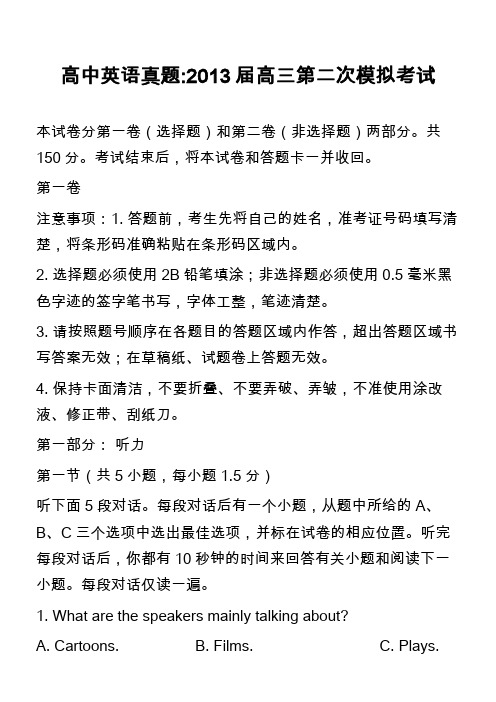
高中英语真题:2013届高三第二次模拟考试本试卷分第一卷(选择题)和第二卷(非选择题)两部分。
共150分。
考试结束后,将本试卷和答题卡一并收回。
第一卷注意事项:1. 答题前,考生先将自己的姓名,准考证号码填写清楚,将条形码准确粘贴在条形码区域内。
2. 选择题必须使用2B铅笔填涂;非选择题必须使用0.5毫米黑色字迹的签字笔书写,字体工整,笔迹清楚。
3. 请按照题号顺序在各题目的答题区域内作答,超出答题区域书写答案无效;在草稿纸、试题卷上答题无效。
4. 保持卡面清洁,不要折叠、不要弄破、弄皱,不准使用涂改液、修正带、刮纸刀。
第一部分:听力第一节(共5小题,每小题1.5分)听下面5段对话。
每段对话后有一个小题,从题中所给的A、B、C三个选项中选出最佳选项,并标在试卷的相应位置。
听完每段对话后,你都有10秒钟的时间来回答有关小题和阅读下一小题。
每段对话仅读一遍。
1. What are the speakers mainly talking about?A. Cartoons.B. Films.C. Plays.2. How many hours does the park open on Saturdays?A. 9.B. 10.C. 13.3. Where does the man want to go?A. To the zoo.B. To the bank.C. To the bus stop.4. What will the speakers do first?A. Repair the shelf.B. Look for the project.C. Put a box on the shelf.5. How did the woman get rid of her house guest?A. She beat her.B. She shouted at her.C. She s aid that she needed the room.第二节(共15小题,每小题1.5分)听下面5段对话或独白。
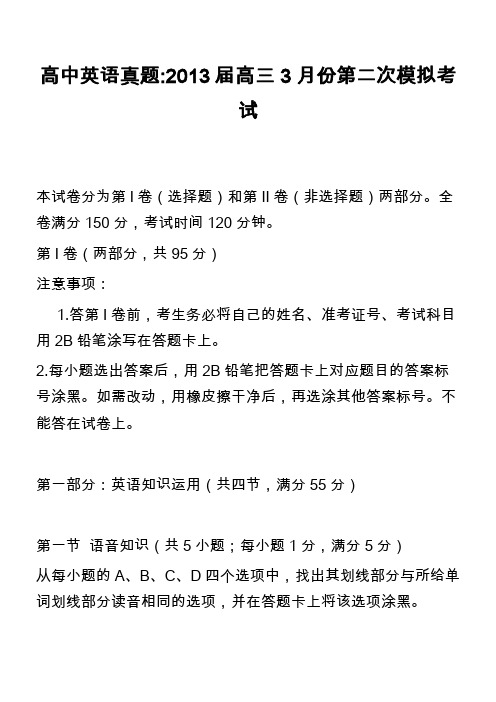
高中英语真题:2013届高三3月份第二次模拟考试本试卷分为第I卷(选择题)和第II卷(非选择题)两部分。
全卷满分150分,考试时间120分钟。
第I卷(两部分,共95分)注意事项:1.答第I卷前,考生务必将自己的姓名、准考证号、考试科目用2B铅笔涂写在答题卡上。
2.每小题选出答案后,用2B铅笔把答题卡上对应题目的答案标号涂黑。
如需改动,用橡皮擦干净后,再选涂其他答案标号。
不能答在试卷上。
第一部分:英语知识运用(共四节,满分55分)第一节语音知识(共5小题;每小题1分,满分5分)从每小题的A、B、C、D四个选项中,找出其划线部分与所给单词划线部分读音相同的选项,并在答题卡上将该选项涂黑。
1. ocean A. medicine B. bacteria C. reduce D. official2. struggle A. super B. truly C. focus D. drunk3. theatre A. area B. dead C. leather D. easy4. rough A. bought B. though C. cough D. ghost5. advances A. makes B. encourages C. argues D. beh aves第二节补全对话(共5小题;每小题1分,满分5分)根据对话情景的内容,从对话后所给的选项中选出能够填入每一空白处的最佳选项,并在答题卡上将该选项涂黑。
选项中有两个为多余选项。
John Smith: Do you know that we’ve been studying Euler in mat h?Zhao Yang: 6John Smith: Well, he was a famous mathmatician in the eightee nth century. He revised all the pure mathematics that was know n in his day.Zhao Yang: 7John Smith: You’re wrong there. He wrote more than any other mathematician before or since.Zhao Yang: Really! 8John Smith: He introduced a lot of symbols into mathematics such as pi(π) and the terms “sine and cosine”Zhao Yang: 9John Smith: And he did half of his work when he was blind. Zhao Yang: 10John Smith: He told his ideas to someone else who wrote them down.A. How did he do that?B. That probably wasn’t very much.C. Wow!D. Who is he? I’ve never heard of him.E. Well, what did he do?F. I hope so.G. Where was he born?第三节语法和词汇知识(共15小题;每小题1分,满分15分)从每小题的A、B、C、D四个选项中,选出可以填入空白处的最佳选项,并在答题卡上将该选项涂黑。
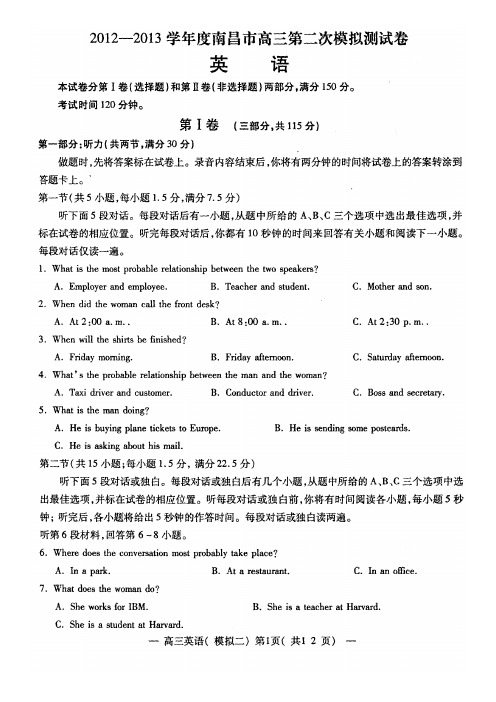
2012—2013学年度南昌市高三第二次模拟测试卷英语参考答案及评分标准第一部分:听力1.A2.B3.C4.A5.B6.A7.C8.C9.B 10.A 11.C 12.B 13.C 14.B 15.C16.A 17.B 18.A 19.C 20.B第二部分:英语知识运用第一节:单项填空21.D 22.D 23.A 24.C 25.D 26.A 27.A 28.D 29.B 30.C 31.D 32.B33.B 34.A 35.B第二节完型填空36.C 37.B 38. A 39.D 40.C 41. A 42.B 43.B 44.D 45.C 46.C 47A48.B 49.D 50 A 51. C 52.D 53.A 54.C 55.B第三部分:阅读理解56.B 57.B 58.C 59.D 60.C 61.D 62.A 63.C 64.B 65.D 66.D 67.B 68.A 69.A70.A 71.C 72.C 73.B 74.D 75.B第四部分写作第一节阅读表达76.How to be happy/ How to stay happy?77.They will lose/miss true happiness.78.Moreover/ What’s more/ In addition79.①friends, health and living conditions; ②your neighborhood ; ③sense of meaning in life.80. human happiness第二节写作One possible version:Dear editor,I’m a senior high school student in Nanchang, named Li Hua. Now many students have iPads and think it’s a fashion to use them. Using an iPad, we can listen to music, download a lot of learning materials and read them on the screen. Apparently, it is helpful to our study, especially to our English listening.Some students, however, bring their iPads to classrooms and listen to music with earphones, which makes the teacher and other students greatly annoyed. What’s worse, some of them even waste precious time in class playing video games.In my opinion, as a student, we should make good use of iPads. The classroom is a place for students to study, and therefore, concentration is badly needed for us to learn our lessons. Furthermore, the school should make a rule to guide the students to use iPads in a proper way.Yours sincerely,Li Hua。
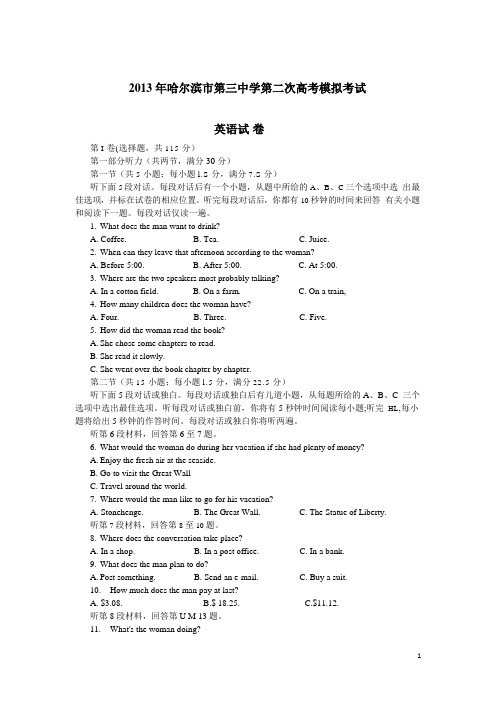
2013年哈尔滨市第三中学第二次高考模拟考试英语试卷第I卷(选择题,共115分)第一部分听力(共两节,满分30分)第一节(共5小题;每小题l.S分,满分7.S分)听下面5段对话。
每段对话后有一个小题,从题中所给的A、B、C三个选项中选出最佳选项,并标在试卷的相应位置。
听完每段对话后,你都有10秒钟的时间来回答有关小题和阅读下一题。
每段对话仅读一遍。
1. What does the man want to drink?A. Coffee.B. Tea.C. Juice.2. When can they leave that afternoon according to the woman?A. Before 5:00.B. After 5:00.C. At 5:00.3. Where are the two speakers most probably talking?A. In a cotton field.B. On a farm.C. On a train,4. How many children does the woman have?A. Four.B. Three.C. Five.5. How did the woman read the book?A. She chose some chapters to read.B. She read it slowly.C. She went over the book chapter by chapter.第二节(共15小题;每小题l.5分,满分22.5分)听下面5段对话或独白。
每段对话或独白后有儿道小题,从每题所给的A、B、C 三个选项中选出最佳选项。
听每段对话或独白前,你将有5秒钟时间阅读每小题;听完HL,每小题将给出5秒钟的作答时间。
每段对话或独白你将听两遍。
听第6段材料,回答第6至7题。
6. What would the woman do during her vacation if she had plenty of money?A. Enjoy the fresh air at the seaside.B. Go to visit the Great WallC. Travel around the world.7. Where would the man like to go for his vacation?A. Stonehenge.B. The Great Wall.C. The Statue of Liberty.听第7段材料,回答第8至10题。
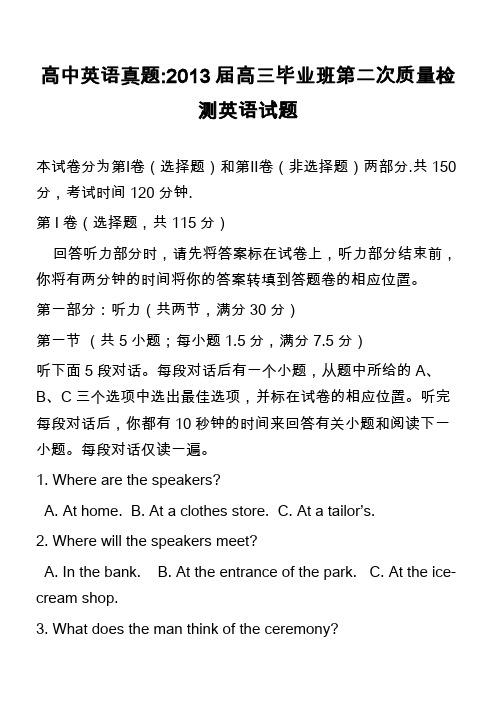
高中英语真题:2013届高三毕业班第二次质量检测英语试题本试卷分为第Ⅰ卷(选择题)和第Ⅱ卷(非选择题)两部分.共150分,考试时间120分钟.第I卷(选择题,共115分)回答听力部分时,请先将答案标在试卷上,听力部分结束前,你将有两分钟的时间将你的答案转填到答题卷的相应位置。
第一部分:听力(共两节,满分30分)第一节(共5小题;每小题1.5分,满分7.5分)听下面5段对话。
每段对话后有一个小题,从题中所给的A、B、C三个选项中选出最佳选项,并标在试卷的相应位置。
听完每段对话后,你都有10秒钟的时间来回答有关小题和阅读下一小题。
每段对话仅读一遍。
1. Where are the speakers?A. At home.B. At a clothes store.C. At a tailor’s.2. Where will the speakers meet?A. In the bank.B. At the entrance of the park.C. At the ice-cream shop.3. What does the man think of the ceremony?A. Noisy.B. Boring.C. Exciting.4. Why is there no paper?A. The other department took some.B. The woman forgot to order.C. The man used it up.5. What is Emily going to do?A. Prepare a report.B. Cook fish.C. Have lunch with Linda.第二节(共15小题;每题1.5分,满分22.5分)听下面5段对话或独白。
每段对话或独白后有几个小题,从题中所给的A,B,C三个选项中选出最佳选项,并标在试卷的相应位置。
听每段对话或独白前,你将有时间阅读各个小题,每小题5秒钟;听完后,每小题将给出5秒钟的作答时间。
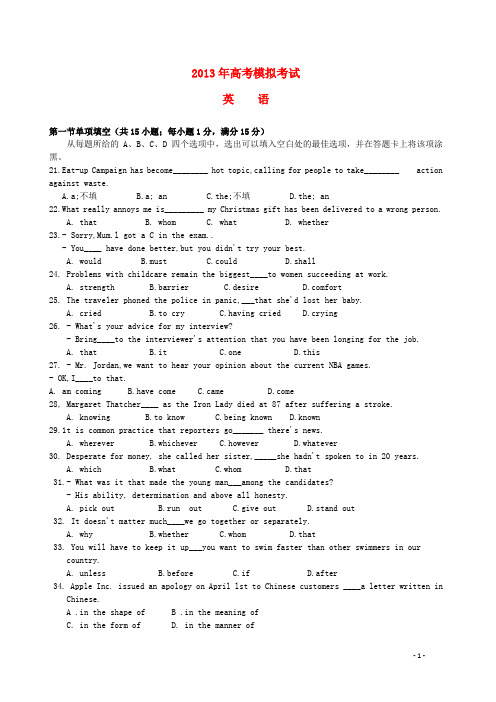
2013年高考模拟考试英语第一节单项填空(共15小题;每小题1分,满分15分)从每题所给的A、B、C、D四个选项中,选出可以填入空白处的最佳选项,并在答题卡上将该项涂黑。
21.Eat-up Campaign has become________ hot topic,calling for people to take________ action against waste.A.a;不填B.a; anC.the;不填D.the; an22.What really annoys me is_________ my Christmas gift has been delivered to a wrong person.A. thatB. whomC. whatD. whether23.- Sorry,Mum.l got a C in the exam..- You____ have done better,but you didn't try your best.A. wouldB.mustC.couldD.shall24. Problems with childcare remain the biggest____to women succeeding at work.A. strengthB.barrierC.desirefort25. The traveler phoned the police in panic,___that she'd lost her baby.A. criedB.to cryC.having criedD.crying26. - What's your advice for my interview?- Bring____to the interviewer's attention that you have been longing for the job.A. thatB.itC.oneD.this27. - Mr. Jordan,we want to hear your opinion about the current NBA games.- OK,I____to that.A. am comingB.have comeC.camee28, Margaret Thatcher____ as the Iron Lady died at 87 after suffering a stroke.A. knowingB.to knowC.being knownD.known29.1t is common practice that reporters go_______ there's news.A. whereverB.whicheverC.howeverD.whatever30. Desperate for money, she called her sister,_____she hadn't spoken to in 20 years.A. whichB.whatC.whomD.that31.- What was it that made the young man___among the candidates?- His ability, determination and above all honesty.A. pick outB.run outC.give outD.stand out32. It doesn't matter much____we go together or separately.A. whyB.whetherC.whomD.that33. You will have to keep it up___you want to swim faster than other swimmers in ourcountry.A. unlessB.beforeC.ifD.after34. Apple Inc. issued an apology on April lst to Chinese customers ____a letter written in Chinese.A .in the shape ofB .in the meaning ofC. in the form ofD. in the manner of35.-David,you got hurt again.-Oh,____!A. my pleasureB. just my luckC. take careD. go ahead第二节完形填空(共20小题;每小题1分,满分20分)阅读下面短文,掌握其大意,从每题所给的A.B.C.D四个选项中,选出最佳选项,并在答题卡上将该项涂黑。
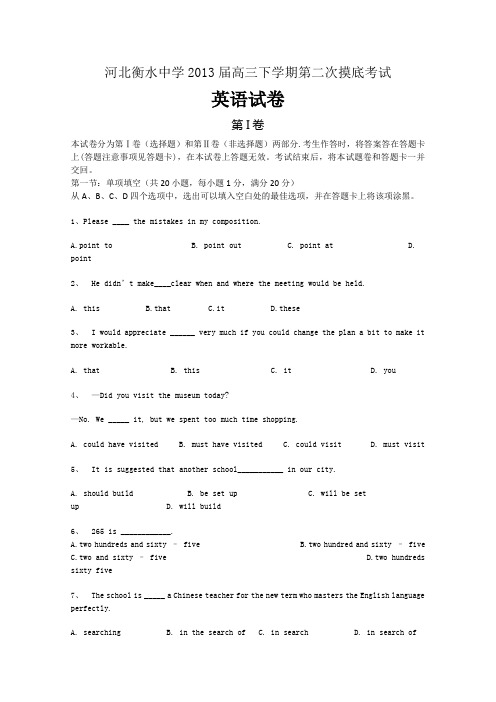
河北衡水中学2013届高三下学期第二次摸底考试英语试卷第I卷本试卷分为第Ⅰ卷(选择题)和第Ⅱ卷(非选择题)两部分.考生作答时,将答案答在答题卡上(答题注意事项见答题卡),在本试卷上答题无效。
考试结束后,将本试题卷和答题卡一并交回。
第一节:单项填空(共20小题,每小题1分,满分20分)从A、B、C、D四个选项中,选出可以填入空白处的最佳选项,并在答题卡上将该项涂黑。
1、Please ____ the mistakes in my composition.A.point toB. point outC. point atD. point2、 He didn’t make____clear when and where the meeting would be held.A. thisB.thatC.itD.these3、 I would appreciate ______ very much if you could change the plan a bit to make it more workable.A. thatB. thisC. itD. you4、—Did you visit the museum today?—No. We _____ it, but we spent too much time shopping.A. could have visitedB. must have visitedC. could visitD. must visit5、 It is suggested that another school___________ in our city.A. should buildB. be set upC. will be set upD. will build6、 265 is ____________.A.two hundreds and sixty – fiveB.two hundred and sixty – fiveC.two and sixty – fiveD.two hundreds sixty five7、 The school is _____ a Chinese teacher for the new term who masters the English language perfectly.A. searchingB. in the search ofC. in searchD. in search of8、 He is a foreigner and he is not accustomed _______like that while he i8 tn China.A.treating B.to be treated C.to being treated D.to treat9、— I think my child’s behavior is _______ .— No, he just has a lot of energy.A. informationB. naturalC. normalD. abnormal10、 Visitors were _____at the _____pictures that the guide showed.A. amazed; amazingB. amazed; amazedC. amazing; amazingD. amazing; amazed11、 If you go there by ____train ,you can have quite a comfortable journey ,but make sure you get ___fast one.A. /; /B. /; aC. the; aD. the ; /12、 We are so sorry for that.We'll try to determine exactly _________ went wrong that evening.A. whereB. whatC. whichD. how13、 With just four years _______, the Brazil Olympic organizers have promised to deliver an equally inspirational ceremony.A. goneB. to goC. goingD. go14、 Although the causes of cancer_____, we do not yet have any practical way to prevent it.A. are being uncoveredB. have been uncoveringC. are uncoveringD. have uncovered15、 His idea was such a good one ______ we all agreed to use it.A. asB. thatC. soD. but16、 What is even more important is______ the earth cooled down, water began to appear on its surface.A.thatB.that asC.whichD.which as17、—I drove to Zhuhai for the air show last week..—Is that ________ you had a few days off ?A. whereB. whenC. whatD. why18、 ---- Have you heard that Tom, as well as his parents, _____ moved to Beijing?---- Really? No _____ I haven’t seen him for a long time.A. have; doubtB. has; wonderC. have; wonderD. has; choice19、— Is it good to look up every new word when I come across it in reading?—No,you _____,because you are likely to guess the meaning from the context,A. don't have toB. shouldn'tC. can'tD. mustn't20、--Can I smoke here?--Sorry, we don’t allow __________ here.A. people smokeB.to smokeC. people smokingD. smoking第二节完型填空(共20小题;每小题1.5分,满分30分)阅读下面短文,从短文后各题所给的四个选项(A、B、C和D)中,选出最佳选项,并在答题卡上涂黑。
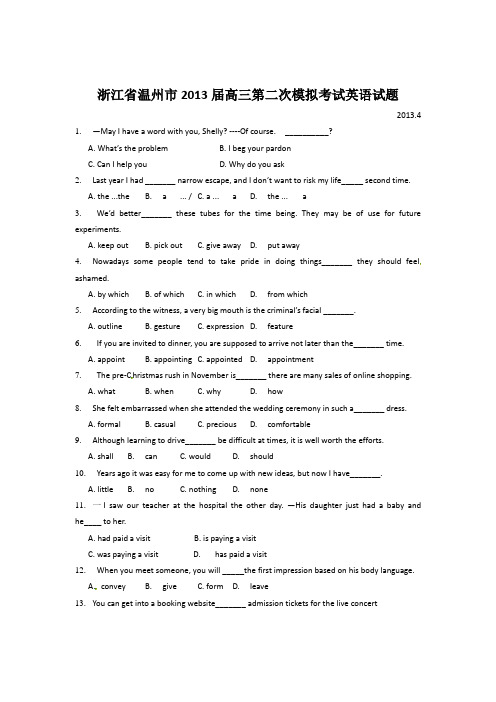
浙江省温州市2013届高三第二次模拟考试英语试题2013.41.—May I have a word with you, Shelly? ----Of course. __________?A. What’s the problemB. I beg your pardonC. Can I help youD. Why do you askst year I had _______ narrow escape, and I don’t want to risk my life_____ second time.A. the ...theB. a ... /C. a ... aD. the ... a3.We’d better_______these tubes for the time being. They may be of use for future experiments.A. keep outB. pick outC. give awayD. put away4.Nowadays some people tend to take pride in doing things_______ they should feel ashamed.A. by whichB. of whichC. in whichD. from which5.According to the witness, a very big mouth is the criminal’s facial _______.A. outlineB. gestureC. expressionD. feature6.If you are invited to dinner, you are supposed to arrive not later than the_______ time.A. appointB. appointingC. appointedD. appointment7.The pre-C hristmas rush in November is_______ there are many sales of online shopping.A. whatB. whenC. whyD. how8.She felt embarrassed when she attended the wedding ceremony in such a_______ dress.A. formalB. casualC. preciousD. comfortable9.Although learning to drive_______ be difficult at times, it is well worth the efforts.A. shallB. canC. wouldD. should10.Years ago it was easy for me to come up with new ideas, but now I have_______.A. littleB. noC. nothingD. none11.一I saw our teacher at the hospital the other day. —His daughter just had a baby and he____ to her.A. had paid a visitB. is paying a visitC. was paying a visitD. has paid a visit12.When you meet someone, you will _____the first impression based on his body language.A.conveyB. giveC. formD. leave13.You can get into a booking website_______ admission tickets for the live concertA. besidesB. viaC. withoutD. for14._______ these brochures among the tourists before you leave, will you?A. Having distributedB. To distributeC. DistributeD. Distributing15.The manager has a strong preference for a job interview, for it evaluates a candidate more_______ .A. thoroughlyB. roughlyC. frequentlyD. smoothly16.Various efforts over the centuries to predict earthquakes to reduce the damage.A. are being madeB. have been madeC. were madeD. were being made17.—They say you are going to Hawaii for summer vacation. 一Well, _______I can get my visa.A. as far asB. so long asC. now thatD. even if18.With three goals in the first period they had a promising victory, but they lost.A. somehowB. besidesC. otherwiseD. therefore19.I’m fed up with this wet weather. It is time we _______some sunshine for a picnic.A. haveB. will haveC. had hadD. had20.---Could you be so kind as to work an hour overtime, Portia? _____,if you think it is necessary.A. Go aheadB. Yes, pleaseC. I’m afraid notD. With pleasure1第二节完形填空:(共20小题;每小题1分,满分20分)Two devoted friends, Sam and Jason, met with an accident on their way to Boston City. Jason woke up 21 a couple of days later, and Sam was 22 unconscious (昏迷的).Dr. Berkeley kept standing at Sam’s bedside looking at his health chart. When he found Sam 23_,he smiled at him and asked. “How are you 24 today, kid?” Sam tried to appear 25, sayi ng, “absolutely wonderful, Doctor.” Dr Berkeley was 26 by what Sam had decided to do for his best friend Jason. But what he 27 say was, “Y ou are very strong in heart and God bless you”. While he was moving 28 the next patient, Sam called back at him almost pleading (祈求),“_29me that you won’t tell Jason anything”. “I won’t do that. Trust me.” said the doctor.Months later, when Jason had recovered completely, he stopped 30 with Sam. He felt discouraged and embarrassed to spend time with a(n) 31 person like Sam. Sam was lonely and depressed, 32 he didn’t have anybody else other than Jason to 33 . Things went from bad to worse. And eventually one day Sam died in34. When Jason was called to hospital, he 35 a letter left by Sam, which said: “ Dear Jason, I have made up my mind in the end to lend you my 36. Now I’m so glad that you will see the world through my eyes.”“I had promised Sam to keep the sacrifice (牺牲)he made as a 37,’ said Dr. Berkeley, “But 38 I wish I didn’t stick to it, because I don’t think it w as worthwhile.” 39 that was left for Jason was tears of regret and memories of Sam for the rest of his life .No matter 40 happens, if we make a friend, we should stick by him till the end. Life is meaningless without a friend to be with you through thick and thin.23. A. awake B. secure C. sleepy D. energetic26. A. puzzled B. amused C. moved D. annoyed28. A. away from B. on to C. along with D. back into33. A. hear from B. search for C. depend on D. worry about39. A. All B. Something C. Much D. Nothing2第二部分阅读理解:(第一节20小题,第二节5小题;每小题2分,满分50分)AIs the world clear out of geniuses (天才)?Will we ever have another Copernicus, another Darwin, another Einstein to shake our beliefs?Keith Simonton, professor of psychology at the University of California, has devoted the better part of his career to studying geniuses people who possess what he calls the highest level of scientific creativity. Simonton is talking about more than just wisdom. A true genius, therare member of society, is a Renaissance human who can completely change the way we understand the world. Geniuses are people who come up with “surprising ideas that are not a mere extension (延伸)of what is already known”.A historical tour through the scientific revolution contains many people who fit this definition (定义),such as Einstein, Copernicus, Darwin, Galileo, Newton and Marie Curie. Each man and woman totally upended (颠覆)entire fields of research, or created entirely new ones. Simonton argues: “When was the last time that someone forced us to rewrite the textbooks in some f ield? Can you think of anybody since DNA? Stephen Hawking? I’m not so sure by my definition. Just a highly creative scientist.”So let’s agree we’ve lost modem geniuses. Actually people are not duller as a whole and certainly scientists have high IQs. They probably have more original intelligence than people like Copernicus, because they have to gain so much more experience and knowledge to even become practiced in their fields. “Once you didn’t need to go to college to become a great scientist. Later you needed college but not graduate school (研究生院).Then graduate school but not a post-doctoral school.” Simonton said. “It’s becoming increasingly difficult to be a learned scientist.”The biggest and most fundamental problems in science have been solved. Every new advancement is just fitting in a piece in a larger puzzle. The scientists who will do this are still honorable individuals: Simonton compares them to Olympians. Just as athletes can win an Olympic gold medal by beating the world record only by a small part of a second, scientists can receive Nobel prizes for improving a small bit of theories.But the next great advances in research are combination of the classic subjects, Simonton points out. In the last century, we’ve gained astro-biology, astro-physics, bio-chemistry, and the like. When two subjects are mixed now, the result builds upon the work in the two subjects.Are there any great chances for combination of the major subjects? For biology, maybe it’s the origin of life: What’s the spark that got amino acids (氨基酸)to form proteins that eventually result in cells? In physics, maybe it’s the inability to unite gravity with the three other forces of nature. “It ;nay well be that the only way to unite the four forces of nature is to rebuild physics from the ground up. That would take a major revolution. It takes only one new scientific genius to do that,” he wrote.41.How many geniuses does Keith Simonton mention in the passage?A. 3B. 5C. 6D. 742.What is a genius according to Mr. Simonton’s definitio n?A. A creative man who can invent many thingsB. A wise human born in the Renaissance daysC. A person who can change the idea of the worldD. A scientist who extends our knowledge greatly43.Simonton believes people nowadays .A. are less intelligent than former generationsB. can’t think as properly as Copernicus didC. are not working hard to be knowledgeableD. need more education to become scientists44.In Simonton’s eyes, modem scientists are making their contribution byA. improving theories a bitB. solving biggest problemsC. performing honorable deedsD. receiving Nobel prizes45.From the last two paragraphs, we learn that future scientific geniuses .A. will know a classic subject thoroughlyB. should work on more than one subjectC. must understand amino acids and cellsD. can explain the four forces of nature3BStarting to learn how to swim can be scary and for adults, embarrassing. This is a way you can learn how to swim by yourself without another person. The steps are detailed to help explain the exercise. Once you are comfortable with the exercises, go to the next step. Now, get out there and have fun!Step 1First find the area you wil l practice in. Water should be at least to your waist but lower than your neck. If you experience any problems all you have to do is stand up.Start by holding onto the edge of the pool. Kick up your feet, and kick your legs alternately. Next, keep yourself under water for 5 seconds. Exhale (呼气)when the 5 seconds end as you are going up towards the surface. Breathe in after your head breaks the surface and go back under water for another 5 seconds. Repeat for 5 minutes.Step 2Take out your floating device (装置) Put it under your arms. Kick your feet up and practice kicking like you do on step 1 with the wall. For now, keep your head out of the water. Practice holding your breath and going under water, but try holding your breath for 10 seconds. Repeat for 5 minutes.Step 3Put your floating device under your arms. This time, while kicking, put your head in the water for five seconds. Exhale in the water as you bring your head out of the water towards the side of your body. Breathe in quickly and then put your head back in the water. Continue with this for 10 minutes.Along with breathing to the side, practice lifting your head straight out of the water. Exhale as you lift your head out of the water after five seconds, breathe in quickly and then put your head in the water again. Practice for 5 minutes.Step 4You are now going to start using your arms to support yourself. Place the floating thing under your chest and use your arms to move yourself. To do this, hold your arms out like a T, ball your fists and bring your arms into your chest. Then open your fists into a straight palm (手掌)and straighten out your arms until they are straight and in line with your head. Next, start to open your arms to go into the T position again.Use force to move yourself and gently pull your arms into your chest. With the floating device you can start slowly, but eventually this should be a smooth, quick single motion. Continue your breathing exercise. Try to hold your breath for longer than 10 seconds.Step 5Now add kicking to your first exercise in step 4. While your arms are not moving you should always be kicking. You can alternate (交替)moving your arms and kicking. Move your body in the direction you want to go.Once you are able to kick and move your arms, add breathing, with your head going straight out of the water. Inhale (吸气)when your arms are in T position. You will exhale on step 3 and bring your head out of the water during step 4 to inhale and go back under on step 1.Practice these exercises until you can do them all together without pausing or slowing. Step 6Now it is time to remove your floating device. Start by kicking your feet up, or you can kick off the bottom of the pool sending you into a forward motion.Start moving your arms immediately like you do in step 4. Breathe by lifting your head straight up. Continue the exercise.46.The passage is mainly about how to_______.A. overcome water fearB. breathe under waterC. teach yourself to swimD. follow a coach to swim47.Which step is concentrated on the training of arms?A. Step 1B. Step 2C. Step 3D. Step 448.The purpose of Step 5 is to_______.B.add kicking to your arm movementC.alternate moving your arms and kickingD.move your body in the direction you want to gobine the movements of arms, legs and body with breath449.One particular exercise runs through all six steps, which is _______.A. the use of floating deviceB. the moving of the armsC. the practice of breathingD. the kicking of the feetCRecent stories in the press about teenage cyberbullying (网络欺凌)and real-world bullying are worrying. It’s hard to know how much cyberbullying contributed to her decision to kill herself, but the case of Phoebe Prince, a 15-year-old girl from Massachusetts, brings tears to my eyes. There is also the case of Alexis Pilkington, a 17-year-old girl from New Y ork,who committed suicide last month after being cruelly commented on the Web site. There are countless more bullying and cyberbullying cases that don’t makeheadlines. And cases like these have resulted in a bullying panic.However, when it comes to bullying in general, the trend is moving in the right direction. A study published last month in a medical journal found that the percentage of youth reporting physical bullying in the past year went down from 22% to 15%. Another national study of youth bullying came to a similar conclusion. It found that 84% of youth said they wouldn’t forward (转发)an embarrassing e-mail about someone else and only 6 percent said they would. In fact, young people are actually more responsible, more involved in their community, and more tolerant of diversity than they were 20 years ago.Not all surveys have the same results, though. In February, the Cyberbullying Research Center interviewed 4,000 teenagers from a large U.S. school district and found that ov erall 20.7% of teens say they’ve been cyberbullied in their lifeti mes with 7.4% saying they’ve been cyberbullied in the past 30 days. A survey conducted last year found that approximately 19% of teens say they’ve been cyberbullied online or via text messa ge and that 10% say they’ve cyberbullied someone else.There is no denying that there is a problem and I certainly don’t want to sugarcoat (裹以糖衣)it, but it’s also important to look at it from the positive side as well. T aking the issue positively is actual ly a strategy that can help reduce bullying. A better strategy is to try to convince young people that bullying is not only wrong and unacceptable but is abnormal behavior.Adults need to be good role models. Politicians need to think about this next time they make angry remarks against an opponent (对手) Media personalities and talk show hosts need to think about the messages they’re giving to children when they engage in name calling. We all need to be aware of comments we make in the presence of children and even people who comment on blogs need to think about the difference between legal criticism and derision (嘲笑) Children learn by observing our behavior, and there are plenty of adults who behave like bullies.Changing behavior isn’t easy, but it’s not impossible. I’ve been watching the TV show Mad Men, which is set in the 1960s when it was acceptable to smoke around other people, ride in cars without seat belts, leave rubbish everywhere, and make bullying comments. We haven’t yet completely got rid of any of those dangerous or antisocial behaviors, but we’ve come a long way. With joint effort and national leadership, we can do the same with the problem of bullying.50.The author uses the two cases of bullying in Para.l to_______.A. introduce the topicB. support the argumentC. stress the panicD. express his sympathy51.From Para. 2 we know that _______.A. bullying is almost out of controlB. bullying in general is on the increaseC. bullying tends to be on the declineD. bullying is like a disease spreading fast52.What can we do to help reduce bullying effectively according to the passage?A. Look at its positive sides.B. Avoid commenting before teenagers.C. T ake legal measures.D. Educate the young with good behavior.53.The problem of bullying is_______.A. disturbing but can be solved with effortsB. worrying and causes constant painC. alarming and calls for immediate actionD. discouraging and wastes our energy54.What might be the best title of the passage?A. Guidance for Young PeopleB. Teenage Cyberbullying and Ways OutC. Research on Teenage BullyingD. Bullying—A New Challenge5DI was on a 14-day voyage across the Pacific. I shared the same room with Mr. Kelada.I disliked Mr. Kelada. He was chatty. He talked of New York and San Francisco, plays, pictures, and politics. In three days he knew everyone on board. He was certainly the best hated man in the ship. He enjoyed argument. He knew everything better than others, and the possibility of his being mistaken never occurred to him.A man called Ramsay bitterly hated him.Ramsay was an American Embassy serviceman in Japan. He was on his way back to his post, after a visit to New York to fetch his wife who had been spending a year at home. His wife was pretty. Her husband was badly-paid, and she was dressed simply; but she knew how to wear her clothes. She achieved an effect of quiet beauty.One evening, Mr. Kelada talked all his way. The conversation moved to pearls (珍珠).Mr. Kelada told us all about pearls. I believe Ramsay knew nothing about them, but he couldn’t resist(抗拒)the opportunity to fight back at Mr. Kelada, and soon they were in a heated argument. Mr. Kelada hit the table:“I know what I am talking about. I’m going to Japan just to look into pearl business. I know all the best pearls in the world. I can tell pearls with half an eye.”He pointed to a chain that Mrs. Ramsay wore. “You take my word for it, Mrs. Ramsay, that chain y ou’re wearing will never be worth a cent less than it is now.”Mrs. Ramsay hid the chain inside her dress. Ramsay said with a smile: “That’s a pretty chain of Mrs. Ramsay’s, isn’t it4?”“I noticed it at once,” answered Mr. Kelada. “Those are really good pearls.”“I didn’t buy it myself, of course. How much do you think it cost?”“About 15,000 dollars. But on Fifth Avenue, it shouldn’t be surprised to hear that 30,000 was paid for it.”Ramsay smiled: “You’ll be surprised to hear that Mrs. Ramsay bought it for 18 dollars.”Mr. Kelada rushed: “It’s not only real, but also the finest.”“Will you bet on it? I,ll bet you a hundred dollars it’s imitation (腰品”“Done.”“Oh,don’t bet, it’s just imitation.” said Mrs. Ramsay and her tone was unhappy.“Let me look at t he chain, and I can afford to lose 100 do llars,” said Mr. Kelada.“Take it off, dear. Let the gentleman look at it.”Mrs. Ramsay hesitated. “I can’t undo it,,’ she said. “Mr. Kelada c an just believe me.”I had a sudden feeling that something unfortunate was about to occur.Ramsay jumped up: “I’ll undo it.”He handed the chain to Mr. Kelada, who took a mag nifier (方文大镜)and closely examined it. A smile spread over his face. He was about to speak. Suddenly he caught sight of Mrs. Ramsay’s face. It was white. She looked as if she were about to faint (昏迷).She was staring at him with wide and terrified eyes. They held a desperate appeal; it was so clear that I wondered why her husband did not see it.Mr. Kelada stopped with his mouth open.“I was mistaken,’’ he said. “It,s a very good imitation, but as soon as I looked through my glass I saw that it wasn’t real. I think 18 dollars is the right price.”He took out a hundred-dollar bill. He handed it to Ramsay without a word.“Perhaps that’ll teach you a lesson,” s aid Ramsay as he took the money.The story spread over the ship. Mr. Kelada was laughed at badly. But Mrs. Ramsay went to her room with a headache.Next morning I got up and began to shave. Suddenly there was some sound and I saw a letter pushed under the door. I picked it up and saw it was to Mr. Kelada. I handed it to him.He took from the envelope a hundred-dollar bill.6I looked at him smiling: “Were the pearls real?”“Yes. If I had a pretty wife I shouldn’t let he r spend a year in New York while I stayed in Japan,” said he. At that moment I didn’t dislike Mr. Kelada.55.The reason why Mr. Kelada was disliked by many people was that he •A. cared for no one elseB. felt so good with himselfC. pretended to be learnedD. cheated people with lies56.According to the passage, Mr. Ramsay .A. had earned a good wealthB. dressed his wife in a proper wayC. had special interest in pearlsD. intended to teach Kelada a lesson57.“That chain y ou’re wearing will never be worth a cent less than it is now” means .A. the value of the chain is sure to go upB. the value of the chain is going downC. the chain is worth no more than a centD. the chain is just worth nothing at all58.Mrs. Ramsay was unwilling to show her pearls because she knew .A. they were worthless imitationB. they would be made fun ofC. they were really too expensiveD. they would soon lose the value59.It was very of Mr. Kelada not to tell the truth.A. carelessB. impoliteC. cruelD. thoughtful60.We can infer from the pa ssage that Mrs. Ramsay’s pearl chain might be bought by•A. herselfB. her husbandC. her loverD. Mr. Kelada第二节:下面文章中有5处(第61~65题)需要添加小标题。
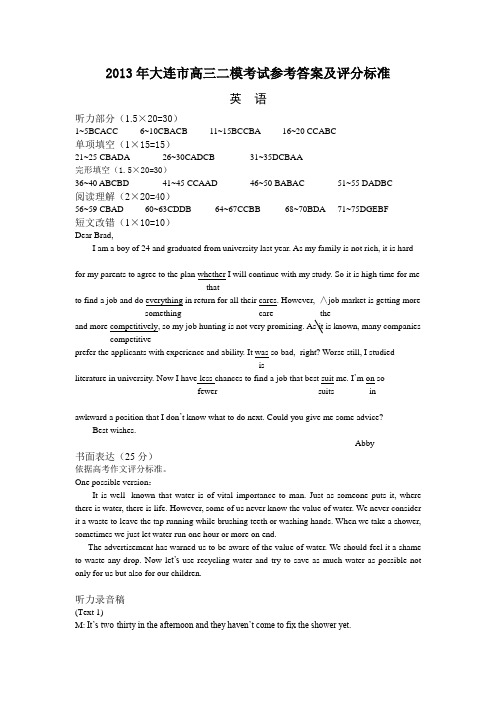
2013年大连市高三二模考试参考答案及评分标准英语听力部分(1.5×20=30)1~5BCACC 6~10CBACB 11~15BCCBA 16~20 CCABC单项填空(1×15=15)21~25 CBADA 26~30CADCB 31~35DCBAA完形填空(1.5×20=30)36~40 ABCBD 41~45 CCAAD 46~50 BABAC 51~55 DADBC阅读理解(2×20=40)56~59 CBAD 60~63CDDB 64~67CCBB 68~70BDA 71~75DGEBF短文改错(1×10=10)Dear Brad,I am a boy of 24 and graduated from university last year. As my family is not rich, it is hardfor my parents to agree to the plan whether I will continue with my study. So it is high time for methatto find a job and do everything in return for all their cares. However, ∧job market is getting more something care theand more competitively, so my job hunting is not very promising. As it is known, many companies competitiveprefer the applicants with experience and ability. It was so bad,right? Worse still, I studiedisliterature in university. Now I have less chances to find a job that best suit me. I’m on sofewer suits inawkward a position that I don’t know what to do next. Could you give me some advice?Best wishes.Abby书面表达(25分)依据高考作文评分标准。
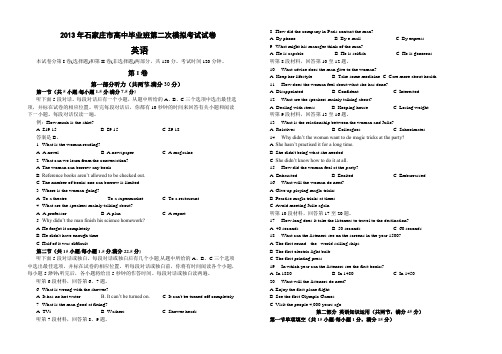
2013年石家庄市高中毕业班第二次模拟考试试卷英语本试卷分第I卷(选择题)和第II卷(非选择题)两部分,共150分。
考试时间120分钟。
第I卷第一部分听力(共两节,满分30分)第一节(共5小题;每小题1.5分,满分7.5分}听下面5段对话。
每段对话后有一个小题,从题中所给的A、B、C三个选项中选出最佳选项,并标在试卷的相应位置。
听完每段对话后,你都有10秒钟的时间来回答有关小题和阅读下一小题。
每段对话仅读一遍。
例:How much is the shirt?A. £19.15.B. £9.15.C. £9.18.答案是B。
1. What is the woman reading?A. A novel.B. A newspaper.C. A magazine.2. What can we learn from the conversation?A. The woman can borrow any book.B. Reference books aren’t allowed to be checked out.C. The number of books one can borrow is limited.3. Where is the woman going?A. To a theatre. To a supermarket. C. To a restaurant.4. What are the speakers mainly talking about?A. A professor.B. A plan.C. A report.5. Why didn’t the man finish his science homework?A. He forgot it completely.B. He didn't have enough time.C. Half of it was difficult.第二节(共15小题;每小题1.5分,满分22.5分}听下面5段对话或独白。
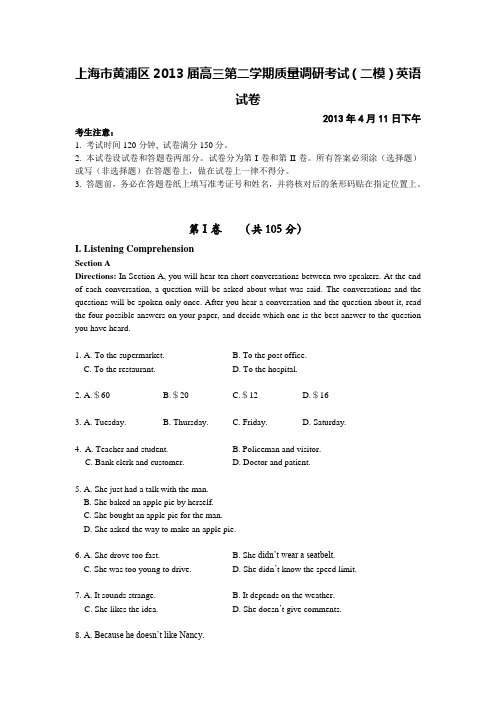
上海市黄浦区2013届高三第二学期质量调研考试(二模)英语试卷2013年4月11日下午考生注意:1. 考试时间120分钟, 试卷满分150分。
2. 本试卷设试卷和答题卷两部分。
试卷分为第I卷和第II卷。
所有答案必须涂(选择题)或写(非选择题)在答题卷上,做在试卷上一律不得分。
3. 答题前,务必在答题卷纸上填写准考证号和姓名,并将核对后的条形码贴在指定位置上。
第I卷(共105分)I. Listening ComprehensionSection ADirections: In Section A, you will hear ten short conversations between two speakers. At the end of each conversation, a question will be asked about what was said. The conversations and the questions will be spoken only once. After you hear a conversation and the question about it, read the four possible answers on your paper, and decide which one is the best answer to the question you have heard.1. A. To the supermarket. B. To the post office.C. To the restaurant.D. To the hospital.2. A.$60 B.$20 C.$12 D.$163. A. Tuesday. B. Thursday. C. Friday. D. Saturday.4. A. Teacher and student. B. Policeman and visitor.C. Bank clerk and customer.D. Doctor and patient.5. A. She just had a talk with the man.B. She baked an apple pie by herself.C. She bought an apple pie for the man.D. She asked the way to make an apple pie.6. A. She drove too fast. B. She didn’t wear a seatbelt.C. She was too young to drive.D. She didn’t know the speed limit.7. A. It sounds strange. B. It depends on the weather.C. She likes the idea.D. She doesn’t give comments.8. A. Because he doesn’t like Nancy.B. Because he wants to go to the library.C. Because he doesn’t like parties.D. Because he has to work on weekdays.9. A. She will be very upset probably.B. She doesn’t care about their removal.C. She feels a little disappointed.D. She thinks it’s better to move to the south.10. A. The woman felt it difficult to make a decision.B. It’s wise for the woman to choose the blue dress.C. The woman should choose the black dress.D. It’s a rather easy choice for the woman.Section BDirections: In Section B, you will hear two short passages, and you will be asked three questions on each of the passages. The passages will be read twice, but the questions will be spoken only once. When you hear a question, read the four possible answers on your paper and decide which one would be the best answer to the question you have heard.Questions 11 through 13 are based on the following passage.11. A. In 1981. B. At the age of 8.C. When he was 17.D. In 2001.12. A. English. B. French. C. Swiss-German. D. Swedish.13. A. He often travels with a coach and crew.B. He lets his girlfriend do with his business affairs.C. His parents used to be Swiss tennis players.D. He got a special reward after winning Wimbledon in 2004.Questions 14 through 16 are based on the following passage.14. A. French explorers. B. British colonists.C. Spanish explorers.D. American Indians.15. A. A land of flowers. B. A Spanish book.C. An island of gold.D. A river in the Middle West.16. A. The influence of American Indians.B. The special names of American States.C. The origins of American States’ names.D. The examples of some American States.Section CDirections: In Section C, you will hear two longer conversations. The conversations will be read twice. After you hear each conversation, you are required to fill in the numbered blanks with the information you have heard. Write your answers on your answer sheet.Blanks 17 through 20 are based on the following conversation.Booking a ticketDestination: London.Class: The 17 class.Price: $ 18 for one way trip.Luggage: A 19 and a handbag.Time: The next flight 20 at 10:25 from Gate 4.Complete the form. Write ONE WORD for each answer.Blanks 21 through 24 are based on the following conversation.Where can the students live whenDormitory or 21 .studying?How much should students pay per10 pounds less per week for 22 .week?How far is it from the residence to theIt is quite near, about 23 .university?Where is the Information office? It’s in 24 .Complete the form. Write NO MORE THAN THREE WORDS for each answer.II. Grammar and VocabularySection ADirections: Beneath each of the following sentences there are four choices marked A, B, C and D. Choose the one answer that best completes the sentence.25.The capital will further limit the number of rush-hour subway passengers to cope with thegrowing pressure _______ the network.A. toB. atC. onD. with26. Three foreign films will be on this month. One is made in Korea, _______ two are made inEngland.A. restB. anotherC. otherD. the other27. Teachers _______ be sensitive to the development level of each student so as to help thembetter.A. need toB. mayC. are able toD. can28. Most students think they should have _______ at school if there were no examinations.A. the happiest timeB. a more happier timeC. much happiest timeD. a much happier time29. The manager listened to the customers’ complaints attentively with great patience, _______ to miss any point.A. not tryingB. trying notC. to try notD. not to try30. Rain and high winds today _______ to take the place of yesterday’s mild conditions.A. expectB. are expectedC. are expectingD. has expected31. _______ parents say and do usually has a life-long effect on their children.A. ThatB. WhichC. WhatD. As32. The adoption of orphans and physically challenged children has been a subject of publicdebate _______ a fire in an unregistered orphanage last month.A. according toB. in case ofC. ever sinceD. such as33. President Barack Obama told ABC news _______ he was aware of the development of therecent investigation.A. thatB. whatC. whichD. whether34. A latest report by Taobao said that visitors through wireless devices _______ from 10million in 2010 to 300 million by the end of last year.A. would growB. has grownC. has been growingD. had grown35. Reform is taking place in the country’s vast countryside, _______ tens of millions offarmers have moved to cities for work.A. whenB. whichC. whereD. that36. In fact, I think it’s very much nicer without the naughty boy, if you don’t mind me _______so.A. sayB. to sayC. sayingD. to saying37. The number of the dead pigs _______ out of the Huangpu River in Shanghai’s SongjiangDistrict had risen to 5,916 by March 12.A. fishedB. to fishC. to be fishedD. fishing38. A 7-year-old boy received an operation on Tuesday successfully _______ he has many otherhealth problems.A. sinceB. howeverC. thoughD. therefore39. China’s plan _______ its installed nuclear power capacity by 20 percent this year shows thatthe country is developing new energy in an efficient way.A. raisedB. to raiseC. raisingD. has raised40. It was announced that only when the terrible disease was under control _______ to return totheir homes.A. the residents would decideB. would the residents decideC. would the residents be decidedD. the residents would be decidedSection BDirections: Complete the following passage by using the words in the box. Each word can only be used once. Note that there is one word more than you need.A. complexityB. imagesC. elementaryD. signalsE. willinglyF.G. mental H. experiment I. leaps J. monsterindependentlyA noted American psychologist once remarked that childhood is a magical period in one’s life. Indeed it is, for during childhood, one undergoes a step-by-step transformation not only in 41 capacity, but also in physical and verbal skills. Each step 42 an increase in the difficulty of a child’s conceptual and learning abilities. During the early stages of childhood, from infancy to about five, the child learns simple skills including using the toilet, bathing and dressing himself 43 . At this stage, he also learns to be very observant, curious, imaginative and creative. His ability to remember things also 44 at this stage. He remembers details that an adult may have difficulty in remembering. Gradually, he learns 45 skills in problem-solving. At school, particular in art classes, the child is especially creative. Given a piece of paper and some colored pencils, he draws a variety of 46 from his surroundings as well as from his family circle. It is not surprising to see a child draw a 47 to represent an abusive father, and an angel to represent a loving and caring mother.As he graduates to the later stages of childhood bordering on the teenage years, the child learns the 48 of human relations and socialization by interacting with his peers—his friends and schoolmates. He also learns to 49 with new life situations, including dates and part-time work. Given a tight schedule of schoolwork, the child learns to prepare his own schedules of work and play; the more practical and less serious ones manage to take time out of their busy schedules of assignments, reports and tests and examinations to go with their friends on relaxation entertainment.III. Reading ComprehensionSection ADirections: For each blank in the following passages there are four words or phrases marked A, B, C and D. Fill in each blank with the word or phrase that best fits the context.When 16-year-old Ella Fitzgerald stepped onto the stage to perform at Harlem’s Apollo Theater in 1934, she had no idea that her life was about to change. Her childhood had been 50 . After the death of her parents, Fitzgerald had been placed in a boarding school. 51 , the teachers at the school mistreated her, so she ran away. Homeless and orphaned, Fitzgerald was trying her best to 52 on the streets of New York City when she won a contest to perform during an amateur night at the Apollo. She had 53 planned to dance, but at the last second, she decided to sing her mother’s favorite song instead. Her performance earned her 54 from several well-known musicians. Ella Fitzgerald went on to become a 55 jazz singer.During a musical career that spanned six decades, Fitzgerald 56 more than 200 albums. She won 13 Grammy Awards, the last of which she received in 1990. She worked with some of the greatest American singers of the twentieth century, including Frank Sinatra, Louis Armstrong, Count Basie, and Dizzy Gillespie. Her talent and charm 57 a wide range of listeners around the world. The worldwide 58 of Ella Fitzgerald helped make jazz a more popular genre.Until the Civil Rights Movement of the 1960s, the United States 59 African American citizens the same treatment that white citizens received. Fitzgerald’s manager and her band 60 to perform at places where discrimination(歧视) was practiced. They also decided not to perform unless they were paid the same amount as white singers and musicians. Ella’s fight for 61 received support from numerous celebrity admirers, including Marilyn Monroe. Fitzgerald never took her good fortune for granted. She gave money to charities and organizations that contributed to 62 disadvantages children. For her many civic contributions, in 1992 President George Bush awarded her the Presidential Medal of Honor, one of the highest honors 63 to civilians.In 1991, Fitzgerald gave her 64 performance in New York’s Carnegie Hall. Although Ella Fitzgerald died in 1996, the American “First Lady of Song” continues to live in the hearts and ears of music lovers worldwide.50. A. rich B. rough C. funny D. happy51. A. Importantly B. Unforgettably C. Naturally D. Unfortunately52. A. survive B. experience C. learn D. stand53. A. strangely B. blindly C. originally D. probably54. A. jealousy B. recognition C. reputation D. gratitude55. A. creative B. dependent C. undiscovered D. distinguished56. A. released B. sold C. copied D. showed57. A. compared with B. appealed to C. composed of D. depended on58. A. celebration B. admiration C. relaxation D. implication59. A. denied B. supported C. offered D. hated60. A. decided B. refused C. started D. afforded61. A. wealth B. future C. equality D. agreement62. A. caring for B. playing with C. preferring to D. picking up63. A. ignorant B. inadequate C. available D. official64. A. best B. vivid C. open D. finalSection BDirections: Read the following three passages. Each passage is followed by several questions or unfinished statements. For each of them there are four choices marked A, B, C and D. Choose the one that fits best according to the information given in the passage you have just read.(A)The seventh-inning stretch is one baseball tradition that helps make the game one of America’s favorite pastimes. In the middle of the seventh inning(局)fans ritualistically stand and stretch before the home team comes to bat.No one really knows the origin of the custom, but there are theories on how it started. Baseball historian Dan Daniel provided this explanation: “It probably began as an expression of fatigue. That would explain why the stretch comes late in the game instead of at the halfway point.”A more popular story involves President William Howard Taft and the birth of two baseball traditions. According to the account, Taft attended the first game of the 1910 baseball season. On the spur of the moment, plate umpire(裁判)Billy Evans gave Taft the ball. He asked him to throw it over the plate. Taft did so, and the custom of having the president launch the baseball season with the first pitch was born.The story continues that later that same day, President Taft, who weighed well over 300 pounds, became uncomfortable in his small chair. In the middle of the seventh inning, he stood up to stretch his legs. The crowd thought that the president was leaving, so they stood up out of respect. A few moments later, Taft sat down again. The fans followed, and the seventh-inning stretch was born. What a day for traditions!No matter how the tradition began, fans have since added to the fun. Now, as they stand to stretch during the seventh inning, they can sing along to Jack Norworth’s 1927 version of the song “Take Me Out to the Ball Game” after the visiting team has batted.65. Which of the following best defines the word “ritualisticall y”in Paragraph 1?A. Attracting attention.B. Showing excitement.C. Continuing a custom.D. Releasing anxiety.66. The seventh-inning stretch is celebrated with the song “Take Me Out to the Ball Game”__________.A. a few moments after the beginningB. after the visiting team has batted in the seventh inningC. between the sixth and seventh inningsD. after the home team has batted in the seventh inning67. In the more popular story, __________.A. Billy Evans attended the first game of the 1910 baseball seasonB. Taft asked Billy Evans to throw the ball over the plateC. President Taft stood up to stretch his legs to relax himselfD. the crowd thought the president didn’t respect the players68. How did the custom of following the “seventh-inning stretch” begin?A. No one knows for sure where or when the custom began.B. Jack Norworth started the tradition with the song in 1927.C. Fans used it as a time to stand and stretch their legs after sitting for the first six innings.D. William Howard Taft stood up and the rest of the fans stood in honor of the president.(B)Calling forContributionsKeen to share your views and have your articles published in the Campus Link?We are calling for contributions to the following sections:Lifestyle:Do you travel widely, keep a journal of your adventures and have nice photographs that you might want to share? Or have you simply been somewhere that caught your imagination? Tell us all about your travels! Are you an eager movie-goer? Be Leonard Maltin for the day and share your views of the latest blockbuster(大片)with our readers!If food is your preferred choice of relaxation, try your hand at being food critic and send us your views on food/restaurants worth trying.Research:If this noble line of work is your bread and butter or passion, we want to hear from you! Share with Campus Link your research developments and breakthroughs. If you know of someone (your schoolmate or teacher) whose research work is a source of inspiration for our community, do not hesitate to send in your suggestions!Class Notes:Whether it’s about youraccomplishments, memories of campusdays, your recent career or a newaddition to your family, we welcomeyou to share your news, views andphotos with friends and classmatesthrough Class Notes. Read about yourclassmates in this issue of CampusLink.If you are interested in sharing any of the above, or if you know of someone worthy of feature, please get in touch with the Editor-in-Chief, at karinyeo@campuslink.sg. Contributions will be selected based on their relevance and quality and Campus Link reserves the right to publish or reject a submission(提交的文章). All contributions will be edited for clarity and length. Please send your submissions in word.doc files and your photos in jpeg format.Contributions for the next issue should reach us by 10 June 2013.69. In the Lifestyle section, you may not find ____________.A. journals of travelsB. well-taken photographsC. stories of Leonard MaltinD. opinions on restaurants70. Which of the following is TRUE about Campus Link?A. It offers readers bread and butter.B. It welcomes research developments and breakthroughs.C. It helps you to recognize your schoolmates and teachers.D. It is a source of inspiration for the community.71. The poster aims to __________.A. declare the rights of Campus LinkB. introduce someone worthy of featureC. share views and articles among teachersD. encourage contributions for the next issue(C)Humans have sewn by hand for thousands of years. It was said that the first thread was made from animal muscle and sinew. And the earliest needles were made from bones. Since those early days, many people have been involved in the process of developing a machine that could do the same thing more quickly and with greater efficiency.Charles Wiesenthal, who was born in Germany, designed and received a patent on a double-pointed needle that eliminated the need to turn the needle around with each stitch(缝合) in England in 1755. Other inventors of that time tried to develop a functional sewing machine, but each design had at least one serious imperfection.Frenchman Barthelemy Thimonnier finally engineered a machine that really worked. However, he was nearly killed by a group of angry tailors when they burned down his garment factory. They feared that they would lose their jobs to the machine.American inventor Elias Howe, born on July 9, 1819, was awarded a patent for a method of sewing that used thread from two different sources. Howe’s machine had a needle with an eye at the point, and it used the two threads to make a special stitch called a lockstitch. However, Howe faced difficulty in finding buyers for his machines in America. In frustration, he traveled to England to try to sell his invention there. When he finally returned home, he found that dozens of manufacturers were adapting his discovery for use in their own sewing machines.Isaac Singer, another American inventor, was also a manufacturer who made improvements to the design of sewing machines. He invented an up-and-down-motion mechanism that replacedthe side-to-side machines. He also developed a foot treadle(脚踏板) to power his machine. This improvement left the sewer’s hands free. Undoubtedly, it was a huge improvement of the hand-cranked machine of the past. Soon the Singer sewing machine achieved more fame than the others for it was more practical, it could be adapted to home use and it could be bought on hire-purchase. The Singer sewing machine became the first home appliance, and the Singer company became one of the first American multinationals.However, Singer used the same method to create a lockstitch that Howe had already patented. As a result, Howe accused him of patent infringement(侵犯). Of course, Elias Howe won the court case, and Singer was ordered to pay Howe royalties(版税). In the end, Howe became a millionaire, not by manufacturing the sewing machine, but by receiving royalty payments for his invention.72. Barthelemy Thimonni er’s garment factory was burned down because _____________.A. people did not know how to put out the fireB. Elias Howe thought Thimonnier had stolen his inventionC. the sewing machines was couldn’t work finallyD. workers who feared the loss of their jobs to a machine set fire73. Which of the following is NOT TRUE according to the passage?A. Singer is an American inventor and manufacturer.B. The Singer sewing company became more practical.C. The foot treadle helped to make the sewer’s hands free.D. Singer made improvements to the design of sewing machines.74. Why did the court force Isaac Singer to pay Elisa Howe a lifetime of royalties?A. Because the judge was against Singer for his surly attitude.B. Because Howe had already patented the lockstitch used by Singer.C. Because Singer had borrowed money from Howe and never repaid it.D. Because Singer and Howe had both invented the same machine.75. Which of the following would be the best title for this passage?A. A Stitch in Time Saves NineB. The Case between Howe and SingerC. Patent Laws on the Sewing MachineD. The Early History of the Sewing MachineSection CDirections: Read the following text and choose the most suitable heading from A-F for each paragraph. There is one extra heading which you do not need.A. What are SIGs?B. What types of memberships are available?C. Who can join IATEFL China?D. What and where is IATEFL China?E. What links does IATEFL China have?F. What happens at the Annual Conference?76.IATEFL China is the International Association of English Language Teachers of English as a Foreign Language, China Branch. Its mother organization IATEFL was founded in the UK in 1967; it now has over 3,500 members in more than 100 countries throughout the world.IATEFL China core activities are managed by the Secretariat headed by the President. The others include, Volunteer activities, SIG Coordinators, and the Publication Committee.It is based in Tonghua City, Jilin Province of the People’s Republic of China and is managed by the President of the association. Other office staff include the General Secretary, the International Affairs Administrator, the Membership Secretary, the Newsletter Distribution, and the General Assistant.77.You can join as a full member and receive the association’s newsletter six times per year, two free publications, free membership to one SIG (Special Interest Group), discounts on publications, reduced conference registration fees, and voting rights.There are also special membership packages for institutional members and for members of IATEFL China’s associates (basic members).By the end of this year, members of IATEFL China can benefit from the special rights provided by the mother organization (IATEFL) at some rate.78.This is the most important event in the association’s calendar and takes place each year in August somewhere in China. It is attended by around 800 delegates each year and includes plenary sessions by eminent practitioners, a large number of workshops, talks and round table discussions given by able speakers, as ELT Exhibition and Pre-Conference Events organized by Special Interest Groups.79.Members can join any number of the 10 Special Interest Groups (SIGs) including: FLT Teaching & Learning Policy; FLT Curriculum & Syllabus Study; Coherence Research on Primary-secondary School and Secondary-Tertiary Transition; Primary School Classroom Instruction Model; Secondary School Classroom Instruction Model; Modern IT in FLT; Applied Linquistics; FL Learning Strategies; FL Teacher Development and Training; FL Textbook, Materials and Teaching Aids Design.80.IATEFL China has associate agreements with other teachers’ associations throughout the world. Among other things, there are usual agreements to exchange newsletters and to provide a speaker to attend each other’s conference at least once every year. More so, committee members from IATEFL China are willing to attend the conferences, meetings, etc. of related associations upon invitation.Section DDirections: Read the passage carefully. Then answer the questions or complete the statements in the fewest possible words.Relations between the United States and Spain were not very good in 1898. On February 15, a battleship called the USS Maine blew up and sank in the harbor at Havana, Cuba. More than 260 Americans were killed. Many Americans thought that Spanish saboteurs (破坏者) had set an underwater mine that caused the explosion.Witnesses and survivors had different versions of what happened. Some said that they heard two explosions. It was discovered that the magazine—which is a storage place for arms, ammunition(军火), and explosives—had exploded. Questions were raised about what caused the first explosion. Did the first explosion come from outside the ship, causing the magazine to explode? Or, did something on the ship blow up the magazine?Other witnesses said that there was only one explosion. If they are right, then what on the ship caused the magazine to explode? A theory supporting the two-explosion version was that rebels from Cuba had caused the explosion. The rebels were aware of the bad feelings between the United States and Spain. They would have been willing to cause trouble between the nations to bring an end to Spanish rule in Cuba.The United States government issued an ultimatum(最后通牒) to the Spanish government to end its occupation of Cuba. When Spanish officials refused, Congress and President William McKinley declared war on Spain. The war did not last long, because the United Sates forced an early surrender.More than 100 years after the explosion of Maine, the cause of the explosion is still unknown. Many questions remain. If an attack from outside the ship caused the magazine to explode, why didn’t witnesses see a splash in the water? Why were there no dead fish in the water if there was an external explosion?With the mystery still unsolved, the question of what really happened to the USS Maine may never be answered.(Note: Answer the questions or complete the statements in NO MORE THAN EIGHT WORDS.)81. On February 15, 1898,more than 260 Americans lost their lives because of __________ .82. According to the passage, the “magazine” was used to _________.83. According to the two-explosion version, what’s the probable purpose of the Cuban rebels tocause the explosion?84. What’s the main topic of the passage?第II卷(共45分)I. TranslationDirections: Translate the following sentences into English, using the words given in the brackets.1. 这个故事激励年轻人为更美好的生活奋斗。
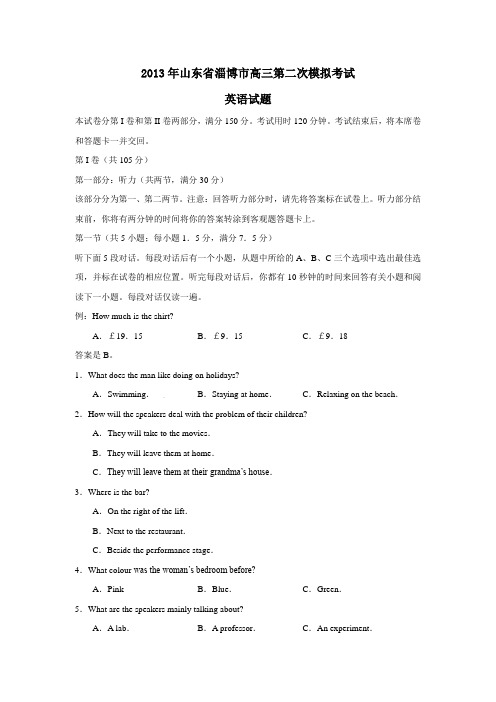
2013年山东省淄博市高三第二次模拟考试英语试题本试卷分第I卷和第II卷两部分,满分150分。
考试用时120分钟。
考试结束后,将本席卷和答题卡一并交回。
第I卷(共105分)第一部分:听力(共两节,满分30分)该部分分为第一、第二两节。
注意:回答听力部分时,请先将答案标在试卷上。
听力部分结束前,你将有两分钟的时间将你的答案转涂到客观题答题卡上。
第一节(共5小题;每小题1.5分,满分7.5分)听下面5段对话。
每段对话后有一个小题,从题中所给的A、B、C三个选项中选出最佳选项,并标在试卷的相应位置。
听完每段对话后,你都有10秒钟的时间来回答有关小题和阅读下一小题。
每段对话仅读一遍。
例:How much is the shirt?A.£19.15 B.£9.15 C.£9.18答案是B。
1.What does the man like doing on holidays?A.Swimming.B.Staying at home.C.Relaxing on the beach.2.How will the speakers deal with the problem of their children?A.They will take to the movies.B.They will leave them at home.C.They will leave them at their grandma’s house.3.Where is the bar?A.On the right of the lift.B.Next to the restaurant.C.Beside the performance stage.4.What colour was the woman’s bedroom before?A.Pink B.Blue.C.Green.5.What are the speakers mainly talking about?A.A lab.B.A professor.C.An experiment.第二节(共15小题;每小题1.5分,满分22.5分)听下面5段话。
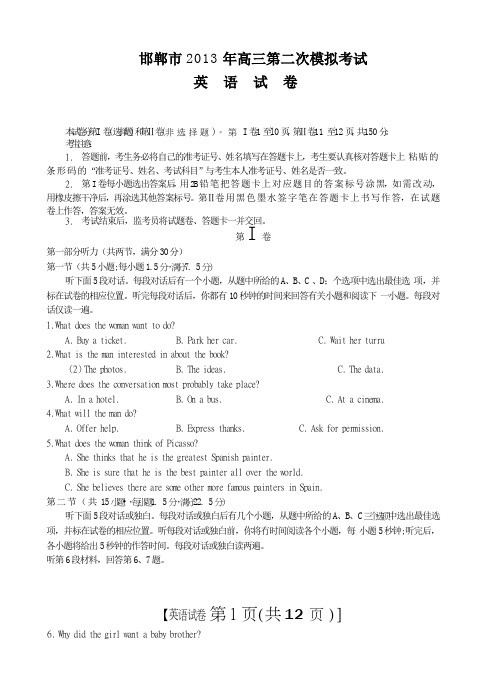
邯郸市2013年高三第二次模拟考试英语试卷本试卷分第I卷(选择题)和第Ⅱ卷(非选择题)。
第I卷1至l0页,第Ⅱ卷11 至12页,共150分。
考生注意:1.答题前,考生务必将自己的准考证号、姓名填写在答题卡上,考生要认真核对答题卡上粘贴的条形码的“准考证号、姓名、考试科目”与考生本人准考证号、姓名是否一致。
2.第I卷每小题选出答案后,用2B铅笔把答题卡上对应题目的答案标号涂黑,如需改动,用橡皮擦干净后,再涂选其他答案标号。
第Ⅱ卷用黑色墨水签字笔在答题卡上书写作答,在试题卷上作答,答案无效。
3.考试结束后,监考员将试题卷、答题卡一并交回。
第I卷第一部分听力(共两节,满分30分)第一节(共5小题;每小题1.5分,满分7. 5分)听下面5段对话。
每段对话后有一个小题,从题中所给的A、B、C 、D;个选项中选出最佳选项,并标在试卷的相应位置。
听完每段对话后,你都有10秒钟的时间来回答有关小题和阅读下一小题。
每段对话仅读一遍。
1.What does the woman want to do?A.Buy a ticket.B. Park her car.C. Wait her turru2.What is the man interested in about the book?(2)The photos. B. The ideas. C. The data.3.Where does the conversation most probably take place?A.In a hotel.B. On a bus.C. At a cinema.4.What will the man do?A.Offer help.B. Express thanks.C. Ask for permission.5.What does the woman think of Picasso?A.She thinks that he is the greatest Spanish painter.B.She is sure that he is the best painter all over the world.C.She believes there are some other more famous painters in Spain.第二节(共15小题•,每小题1. 5分,满分22. 5分)听下面5段对话或独白。
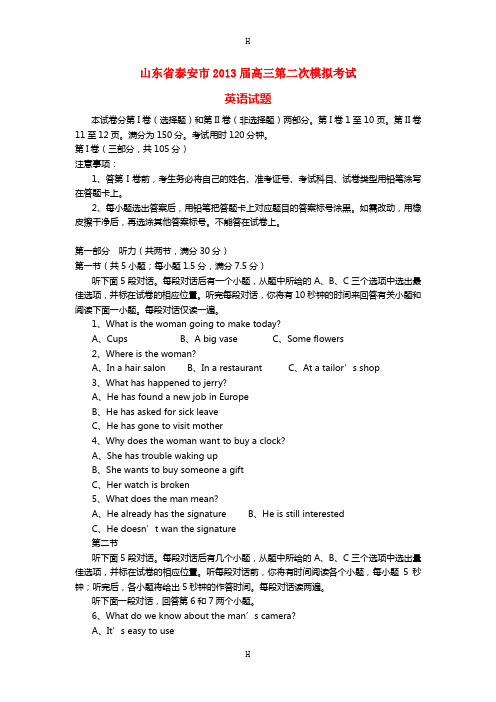
山东省泰安市2013届高三第二次模拟考试英语试题本试卷分第I卷(选择题)和第II卷(非选择题)两部分。
第I卷1至10页。
第II卷11至12页。
满分为150分。
考试用时120分钟。
第I卷(三部分,共105分)注意事项:1、答第I卷前,考生务必将自己的姓名、准考证号、考试科目、试卷类型用铅笔涂写在答题卡上。
2、每小题选出答案后,用铅笔把答题卡上对应题目的答案标号涂黑。
如需改动,用橡皮擦干净后,再选涂其他答案标号。
不能答在试卷上。
第一部分听力(共两节,满分30分)第一节(共5小题;每小题1.5分,满分7.5分)听下面5段对话。
每段对话后有一个小题,从题中所给的A、B、C三个选项中选出最佳选项,并标在试卷的相应位置。
听完每段对话,你将有10秒钟的时间来回答有关小题和阅读下面一小题。
每段对话仅读一遍。
1、What is the woman going to make today?A、CupsB、A big vaseC、Some flowers2、Where is the woman?A、In a hair salonB、In a restaurantC、At a tailor’s shop3、What has happened to jerry?A、He has found a new job in EuropeB、He has asked for sick leaveC、He has gone to visit mother4、Why does the woman want to buy a clock?A、She has trouble waking upB、She wants to buy someone a giftC、Her watch is broken5、What does the man mean?A、He already has the signatureB、He is still interestedC、He doesn’t wan the signature第二节听下面5段对话。
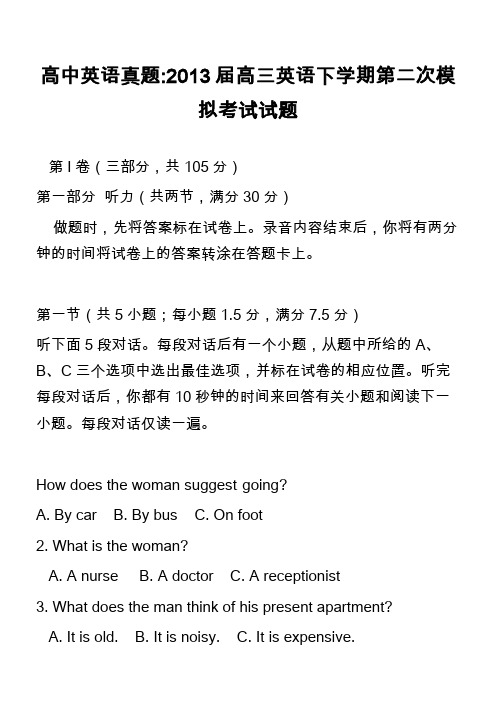
高中英语真题:2013届高三英语下学期第二次模拟考试试题第I卷(三部分,共105分)第一部分听力(共两节,满分30分)做题时,先将答案标在试卷上。
录音内容结束后,你将有两分钟的时间将试卷上的答案转涂在答题卡上。
第一节(共5小题;每小题1.5分,满分7.5分)听下面5段对话。
每段对话后有一个小题,从题中所给的A、B、C三个选项中选出最佳选项,并标在试卷的相应位置。
听完每段对话后,你都有10秒钟的时间来回答有关小题和阅读下一小题。
每段对话仅读一遍。
How does the woman suggest going?A. By carB. By busC. On foot2. What is the woman?A. A nurseB. A doctorC. A receptionist3. What does the man think of his present apartment?A. It is old.B. It is noisy.C. It is expensive.4. What does the man suggest the woman do?A. Buy a jacket.B. Come this Friday.C. Try on a sweater.5. What are the speakers mainly talking about?A. A man’s appearance.B. A man’s behaviorC. A man’s j ob.第二节(共15小题;每小题1.5分,满分22.5分)听下面5段对话或独白。
每段对话或独白后有几个小题,从题中所给的A、B、C三个选项中选出最佳选项,并标在试卷的相应位置。
听每段对话或独白前,你将有时间阅读各个小题,每小题5秒钟;听完后,各小题将给出5秒钟的作答时间。
每段对话或独白读两遍。
听第6段材料,回答第6至8题。
6. What are the speakers doing?A. Visiting a city.B. Taking a walk.C. Having a meal.7. What does the woman often do on Crosswell Hill?A. She goes for a walk.B. She reads books.C. She walks her dog.8. What do we know about the Typewriter?A. It was built on a hill.B. It has many names on it.C. It was built after the First World War.听第7段材料,回答第9至11题。
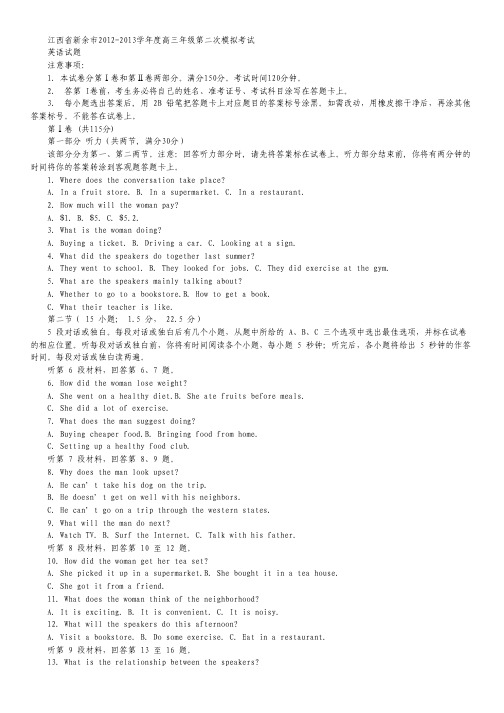
江西省新余市2012-2013学年度高三年级第二次模拟考试 英语试题 注意事项: 1. 本试卷分第Ⅰ卷和第Ⅱ卷两部分。
满分150分。
考试时间120分钟。
2. 答第 I卷前,考生务必将自己的姓名、准考证号、考试科目涂写在答题卡上。
3. 每小题选出答案后, 用 2B 铅笔把答题卡上对应题目的答案标号涂黑。
如需改动,用橡皮擦干净后,再涂其他答案标号。
不能答在试卷上。
第Ⅰ卷 (共115分) 第一部分 听力(共两节, 满分30分) 该部分分为第一、第二两节。
注意:回答听力部分时, 请先将答案标在试卷上。
听力部分结束前, 你将有两分钟的时间将你的答案转涂到客观题答题卡上。
1. Where does the conversation take place?A. In a fruit store.B. In a supermarket.C. In a restaurant. 2. How much will the woman pay?A. $1.B. $5.C. $5.2. 3. What is the woman doing?A. Buying a ticket.B. Driving a car.C. Looking at a sign. 4. What did the speakers do together last summer?A. They went to school.B. They looked for jobs.C. They did exercise at the gym. 5. What are the speakers mainly talking about?A. Whether to go to a bookstore.B. How to get a book. C. What their teacher is like. 第二节( 15 小题; 1.5 分, 22.5 分) 5 段对话或独白。
2013届高三年级第二次模拟英语试卷出题人:李东旭第一卷(115分)第一部分听力(共两节,满分30分)第一节(共5小题:每小题1.5分,满分7.5分)听下面5段对话。
每段对话后有一个小题,从题中所给A、B、C三个选项中选出最佳选项,并标在试卷的相应位置。
听完每段对话后,你都有10秒钟的时间来回答有关小题和阅读下一小题。
每段对话仅读一遍。
1. What would Jane prefer when she had a cold?A. Taking a pill.B. Drinking lots of water.C. Seeing a doctor.2. When must the book reports be handed in?A. By November 3rd.B. By November 13th.C. By November 30th.3. What does the man mean?A. He welcomes the woman.B. He misunderstands the woman.C. He accepts the woman‟s invitation.4. What is the man‟s job?A. A pilot.B. A tour guide.C. A flight attendant.5. How long has the man been smoking?A. For five years.B. For six years.C. For seven years.第二节(共15小题:每小题1.5分,满分22.5分)听下面5段对话或独白。
每段对话或独白后有几个小题,从题中所给A、B、C三个选项中选出最佳选项,并标在试卷的相应位置。
听每段对话后或独白前,你将有时间来阅读各个小题,每小题5秒钟;听完后,各小题将给出5秒钟的作答时间。
每段对话或独白读两遍。
听第6段材料,回答6~8题。
6. What is Burt looking for?A. A new movie.B. A new job.C. A new house7. When will Burt get a reply?A. By Monday.B. By Wednesday.C. By Friday8. Why does Burt think he has a chance?A. The director seems to like him.B. The director and he are relatives.C. He has passed all the exam.听第7段材料,回答9~11题。
9. Where did the man live before?A. In Oak Creek apartment.B. In a student dorm.C. In a house he rented.10. Where do two of the man‟s roommates come from?A. Italy and Britain.B. Brazil and Korea.C. Japan and Hong Kong.11. What can we infer about the woman?A. She is friendly.B. She likes cooking.C. She wants to practice her English.听第8段材料,回答12~14题。
12. What do the two speakers think of Sydney?A. They both love the city.B. They will live there.C. It isn‟t so expensive to live there.13. What does the woman think of cell phone interruption?A. She hates it very much.B. She doesn‟t mind it.C. She considers it rude.14. What the reason does the man give that he answers his cell phone.A. He feels like answer it.B. He wants to know who‟s calling.C. He thinks that it could be something important.听第9段材料,回答15~17题。
15. What are the two speakers probably doing?A. Finding out the truth.B. Typing the statement.C. Checking the record.16. When did the accident happen?A. Yesterday morning.B. This morning.C. This afternoon.17. What is the main cause of the accident?A. The driver was careless.B. The student didn‟t hear the horn.C. The speed of the car was too high.听第10段材料,回答18~20题。
18. What is the passage mainly about?A. An extended family.B. Geography of Asia.C. Children and old people.19. What can old people do when they live with their married children?A. Go shopping, play with children and give advise.B. Look after children, cook, and rule family life.C. Clean rooms take care of children and know new people.20. What is the advantage of living in a big family?A. Children know people very well besides the parentsB. Young parents can travel without children.C. Old people need to be taken good care of.第二部分英语知识运用(共两节,满分45分)第一节单项填空(共15小题;每小题l分,满分l5分)从A、B、C、D四个选项中,选出可以填入空白处的最佳选项,并在答题卡上将该项涂黑。
21.— Could you send me an application for the TOEFL?—_______. What‟s your name and address?A.Yes, I could B.Just a moment C.That‟s right D.No problem 22.— I saw Dave in the lift this morning.— Really? He _______ around here for a long time.A.won‟t be seen B.wasn‟t seenC.hadn‟t been seen D.hasn‟t been seen23._______ blood if you can and many lives will be saved.A.Giving B.Give C.Given D.To give 24.Raising children is said to be a job _______ parents receive the least formal training.A.in which B.for which C.where D.to what 25.— Where _______ you put my dictionary?— I left it on your desk when you _______ to Tom.A.did; spoke B.have; were speakingC.had; were speaking D.had; spoke26.A study shows that walking fast in your old age is a ______ that you will live a long life.A.sign B.mark C.symbol D.signal27.He loved his family, but seldom _______ spend much time with them.A.was he able to B.he was able toC.is he able to D.he is able to28.Most animals have little connection with animals of a different kind, _______ they hunt them for food.A.if B.while C.unless D.as 29.Generally speaking, my grandmother is nice and kind, but she _______ be very stubborn at times.A. shouldB. shallC. mustD. can 30.His suggestion made me angry, but _______.A.making others happy B.to make others happyC.others happy D.with others happy31.It is said that people are________ likely to tell lies over the phone as they are in emails.A.as twice B.twice as C.twice more D.twice than 32.She spent four weeks which she could afford _______ around the country, promotingher new album.A.to tour B.toured C.touring D.having toured 33.According to a new study by a British‟s university, lea rning ________ second language can lead to ________ increase in your brain power.A.a; the B.不填; the C.a; an D.the; an 34.Thank you for giving up your coffee break to help. I know you always need _________after three classes.A.that B.one C.it D.this35.It‟s nearly 5 years since I worked in the company. I _______ in a school.A.taught B.was teachingC.am teaching D.had been teaching第二节完形填空(共20小题;每小题l.5分,满分30分)阅读下面短文,从短文后各题所给的四个选项(A、B、C和D)中,选出可以填入空白处的最佳选项,并在答题卡上将该项涂黑。